Bringing Capitalism Back. Bringing Capitalism Back.
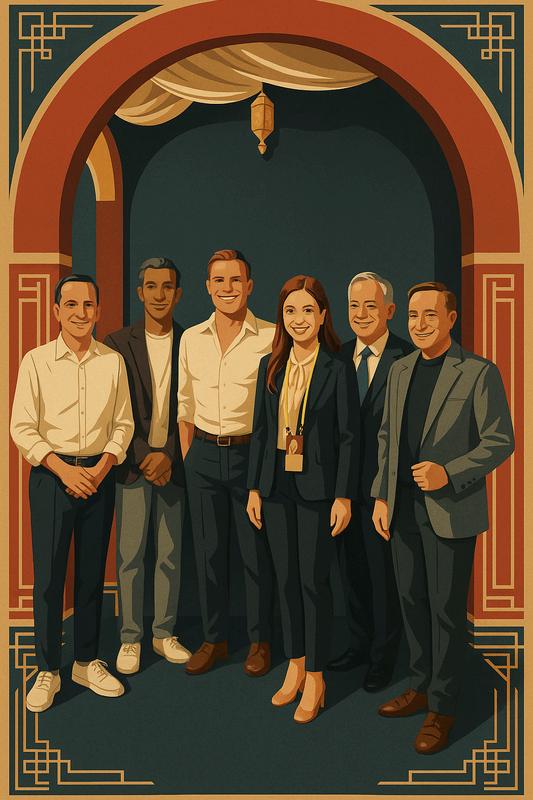







Gallup recently released a poll that should serve as a warning siren for every investor, executive, and entrepreneur in America: support for capitalism has fallen to its lowest level since they began measuring it In the very country that once defined the free market as both a moral and practical foundation for prosperity, fewer Americans than ever before say they believe in it.
More than a number, that statistic is a reflection of a cultural turning point The same system that has lifted billions out of poverty, rewarded innovation, and built the greatest engine of human progress in history is being doubted, misrepresented, and even vilified Yet the problem isn’t that capitalism has failed - it’s that too many of its practitioners have stopped standing up for it
Entrepreneurs know courage Every founder who has risked everything to start a business understands what it means to take a leap into the unknown, to face uncertainty, to bet on themselves and their ideas That same courage is now needed from every investor, executive, and business leader in America not just to build companies, but also to defend the system that makes building possible in the first place
We need courage in the boardroom or the marketplace, and in the public square. It takes courage to put your name and reputation behind capitalism when it’s unpopular It takes courage to say that profit, when earned through voluntary exchange and value creation, is moral. And it takes courage to model what principled capitalism looks like, to live it, speak it, and demonstrate it.
Because there are better and worse ways to be a business leader. Doing business well goes beyond avoiding fraud or theft:
It means living up to the moral principles that make capitalism good
It means respecting individual agency, i e the right of people to choose their own work, trade, and purpose.
It means practicing mutual cooperation: creating situations where everyone involved can benefit
It means focusing on real value creation: producing goods and services that improve lives, not manipulating systems or exploiting loopholes.


It means championing meritocratic opportunity rewarding talent, effort, and innovation wherever it’s found
And it means embracing bottom-up experimentation trusting that the best solutions often come from the people closest to the problems These are the daily practices of principled business. When we embody them, we make the economic system of capitalism a moral one, a way of life that honors human dignity and rewards creativity and contribution
That’s why Capitalists for Capitalism exists: to highlight those who are living these values and to encourage others to do the same. And it’s why I’m so excited for the 2nd Annual Principled Business New York Summit, which is already shaping up to be twice the size of our first. This year, we’re bringing together hundreds of investors, executives, and entrepreneurs from around the world who are committed to building and defending capitalism the right way, through principled leadership and value creation.
If Gallup’s numbers show us the problem, the Principled Business community is the solution Capitalism doesn’t defend itself: it depends on us, its practitioners, to do that.
So to every reader, my challenge is simple: Be courageous. Speak up. Build boldly Live out the principles that make capitalism good And join us at the Summit to stand shoulder to shoulder with others doing the same The future of capitalism depends on the courage of those who believe in it enough to defend it.





Written by: Alexander McCobin
Capitalism doesn’t defend itself It depends on those who practice it to stand up for it Yet too many business leaders today are silent. They are proud capitalists in private, but hesitant to say so publicly. In an age when Gallup reports that approval of capitalism is at its lowest level ever recorded in America, that silence has a cost
The free market has lifted billions out of poverty, fostered unprecedented innovation, and rewarded those who create real value; however, those facts don’t speak for themselves anymore The narrative around capitalism is being rewritten in universities, on social media, and even in the halls of government The system that built the modern world is being painted as immoral, exploitative, or outdated, and the people who know better are too often absent from the debate
It’s time for business leaders to show courage

Entrepreneurs already embody a special kind of courage: the willingness to take risk, to fail publicly, and to persist in the face of uncertainty That same spirit is needed not only to build companies, but to preserve the system that allows those companies to exist When founders, investors, and executives speak up for capitalism, they’re not defending a political ideology they’re defending the moral foundation that makes voluntary cooperation, innovation, and prosperity possible
Courage in this context means more than posting about capitalism on LinkedIn or donating to a think tank. It means openly modeling what principled capitalism looks like. It means being willing to say, without apology, that profit earned through value creation is good, that business, done right, is a moral force It means treating employees, customers, and investors not as tools or obstacles, but as partners in mutual benefit
Capitalism needs leaders who can show the world that this system is built on respect for individual agency, not exploitation; on consent, not coercion; on creativity, not control When we live those principles in our own organizations, when we create environments where merit, innovation, and cooperation thrive, we demonstrate the moral beauty of capitalism more powerfully than any op-ed or policy paper ever could
Yet it still takes courage to do that publicly It means being willing to be misunderstood, to face criticism, and to take a stand in a cultural climate that often rewards conformity over conviction. That’s the same courage that built businesses in the first place: the courage to bet on truth and perseverance over comfort and approval
At this moment in history, the greatest threat to capitalism isn’t regulation or competition: it’s apathy. It’s the unwillingness of good business leaders to speak up for the system that has given them, and billions of others, the freedom to create and prosper
If capitalism is to endure, it needs champions. It needs entrepreneurs who are proud to be capitalists, executives who make decisions guided by principle, and investors who allocate capital not only to grow returns but to advance the values that make growth possible In short, capitalism needs courage. Your courage.
Written by: Alexander McCobin
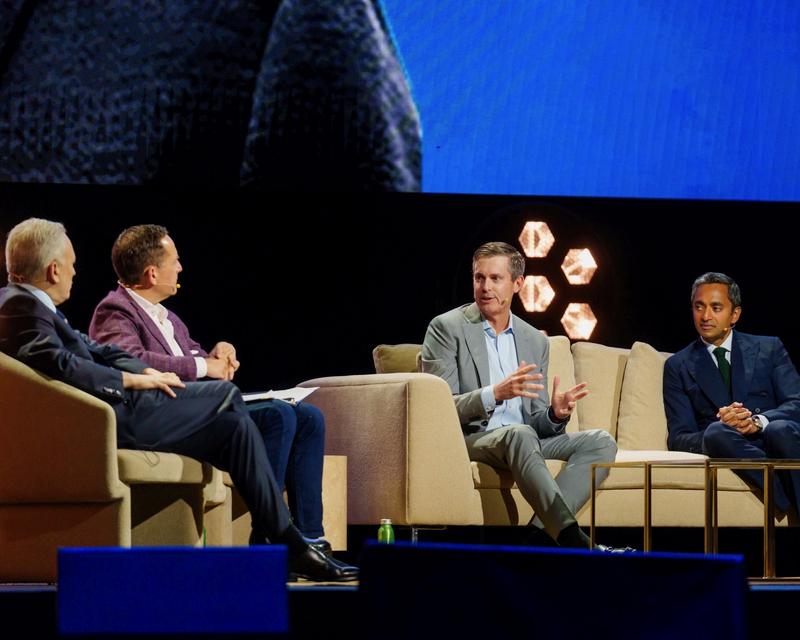
Chamath Palihapitiya said it best at this year’s All-In Podcast Summit: we are standing at a crossroads between a New Dark Age and a New Renaissance It was a powerful framing and a timely one The world feels precarious: wars, cultural division, institutional decay, and the erosion of confidence in business, technology, and even truth itself; however Chamath’s point and the underlying message of the Summit was that the outcome depends on what kind of leaders step up next
What I would add is this: if there is to be a New Renaissance, it will not come from politicians, bureaucrats, nor social activists It will come from capitalists - principled capitalists - who create and lead with courage and conviction.
That spirit was alive on stage throughout the Summit
Dave Ricks, CEO of Eli Lilly and Company, shared the story behind the development of GLP-1 drugs, which are revolutionizing treatments for diabetes, obesity, and metabolic disease He spoke not only about science and market demand, but about foresight, the courage to invest in the next frontier of human health before others saw it. He even predicted the next crisis such drugs could help solve: neurodegenerative disease It was a powerful reminder that progress happens when business leaders act on opportunity long before consensus forms
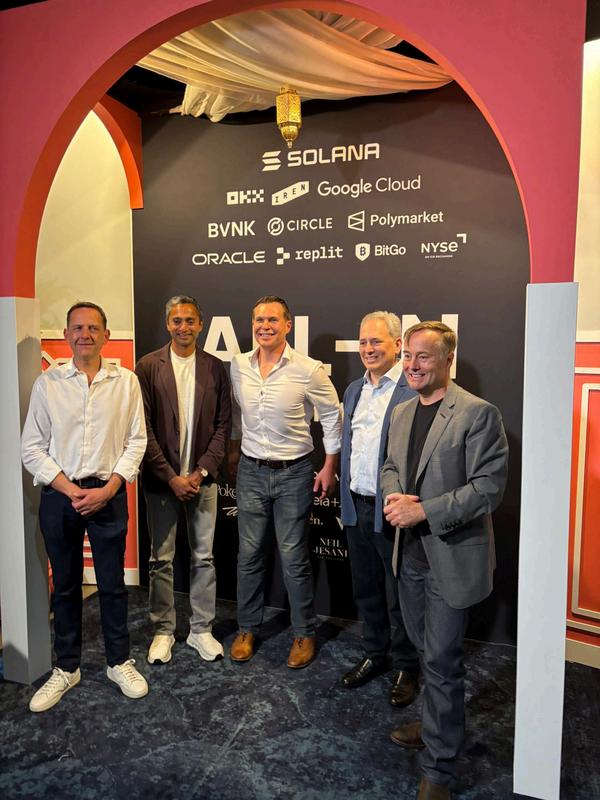
Cathie Wood of ARK Investment Management followed with an unflinching case for optimism She laid out the extraordinary progress unleashed by capitalism over the last century, from computing and biotechnology to space and artificial intelligence Her thesis was clear: when markets are free and entrepreneurs are empowered, innovation compounds Every technological revolution is ultimately a moral one too, because it expands human potential and prosperity.
Alex Karp, CEO of Palantir Technologies, brought that point back to first principles He warned that innovation must not become morally unmoored Technology, he said, must be used to defend the values of a free society, not to impose them on others, but also to protect the conditions that allow free people to flourish. His words reflected a deep truth: capitalism is also about preserving the civilization that makes progress possible
And of course, Elon Musk, a living symbol of that ideal, reminded everyone that the future will not be built by him alone, but by any entrepreneur willing to take risks, challenge orthodoxy, and create. His vision, spanning space, AI, and energy, was not mere spectacle; it was a call to arms for builders everywhere

Through these speakers, the All-In Summit revealed its deeper theme: the New Renaissance will require an elevation of capitalism itself, not cronyism or corporatism, but true capitalism grounded in principle
Chamath himself touched on this near the end He recalled that at the turn of the last century, America’s “business barons” were unashamed to be capitalists and they built not only companies but communities. They didn’t apologize for creating wealth; they used it to build the foundations of modern prosperity Today, however, making money is often treated as morally suspect Many business leaders feel pressured to downplay profit or signal virtue instead of living it Chamath called for reversing that trend to make it good again to start a business, to make money, to create value. That’s not greed: that’s civilization-building
And that’s exactly what principled capitalists are doing today Despite the noise, despite the pessimism, a New Renaissance is already forming in boardrooms, startups, and venture funds led by those who see business not as exploitation, but as creation
At Liberty Ventures, we see this every day with investors, executives, and entrepreneurs who are building the future, guided by the principles that make capitalism moral and sustainable: respect, cooperation, value creation, meritocracy, and freedom
If we want a New Renaissance, we must earn it. And it will be built once again by courageous capitalists.
Written by: Michelle Bernier
At the All-In Summit, Elon Musk shared candid updates on the projects consuming most of his time The conversation covered Optimus, Tesla’s humanoid robot, advances in AI hardware, and Starlink’s direct-to-phone connectivity What stood out was not just the scope of these ventures but Musk’s insistence on tackling problems from first principles, building infrastructure when none exists, and preparing from day one to operate at scale
Optimus: Human-Level Dexterity at Scale
Musk called Optimus “the biggest product ever” if successful He highlighted 3 hurdles that set it apart from other robotics efforts: achieving human-level manual dexterity, developing an AI brain that navigates and comprehends reality, and building a supply chain for human-sized robots from scratch
Human-level dexterity remains the defining challenge. Hands, with their complex mix of joints, tendons, and muscles, allow for everything from delicate tasks like threading a needle to forceful motions such as swinging a bat Reproducing that flexibility in robotics is enormously difficult, yet essential if Optimus is to be generalized Tesla is not waiting for suppliers to catch up Every motor, gearbox, and controller is being engineered internally Even the actuators (26 in each arm) are custom-built because no market-ready options exist Musk projected that once annual production hits 1 million units, marginal cost could fall to between $20,000 and $25,000. The broader lesson for business leaders is clear: when the infrastructure for innovation is missing, create it yourself
AI Hardware: A 40x Jump
Alongside robotics, Musk detailed Tesla’s next-generation chip, AI5, co-developed with the company’s software teams Compared with the current AI4, the new chip promises 8 times more computing power, 9 times more memory, and 5 times more memory bandwidth, while natively supporting functions critical to modern machine learning This integration is expected to push Tesla’s self-driving capabilities to levels 2 to 3 times safer than human drivers
This pursuit underscores Tesla’s refusal to rely on off-the-shelf solutions By designing hardware and software in tandem, the company ensures performance gains that competitors cannot easily replicate

Turning to SpaceX, Musk confirmed a $17 billion spectrum purchase to enable Starlink satellites to connect directly with mobile phones This initiative requires handset modifications, satellites equipped to handle those frequencies, and close collaboration with handset makers over a two-year rollout Musk framed the vision that users should be able to stream video anywhere on their phones, with no distinction between terrestrial and satellite connectivity
The ambition reflects a broader strategy of global reach achieved by solving deeply local technical and regulatory challenges Across these projects, Musk’s message is less about vision than about execution Solve the hardest problem rather than work around it. Build supply chains when none exist. Design software and hardware together to extract every ounce of performance And always prepare for scale, because breakthroughs only matter if they reach millions.
For entrepreneurs and executives, the takeaways are practical as much as inspirational. Musk demonstrates that the future is shaped by leaning into the obstacles others avoid His remarks at the All-In Summit were a reminder that the hardest paths often lead to the most transformative results.
Written by: Michelle Bernier
At the All-In Summit, Uber CEO Dara Khosrowshahi offered a clear look at where he believes transportation is heading and how Uber plans to lead it. His remarks spanned the company’s current strengths and its future bets, from the fundamentals of safety and cost, to the vast potential of autonomy, aerial mobility, and delivery innovation.
Dara made it clear that safety is the first hurdle every autonomous vehicle must clear “We have a certain safety case that we want to make sure our partners adhere to,” he said. That emphasis reflects how Uber now evaluates every new technology: it must demonstrate reliability through data before earning widespread use.
At the same time, the economics are shifting fast Hardware once priced at $20,000 to $30,000 now sells for a few hundred dollars. Those falling costs remove a key barrier to scale, opening a realistic path for large autonomous fleets to operate profitably
Power of a Platform
Dara dismissed the idea that Uber needs to own the vehicles on its network If you look at the end state, all of these cars are going to be financed,” he explained He envisions a structure similar to global hotel brands, which manage demand while property owners supply the physical assets. Financial firms will purchase and finance vehicles, while Uber will coordinate the marketplace that keeps them in motion
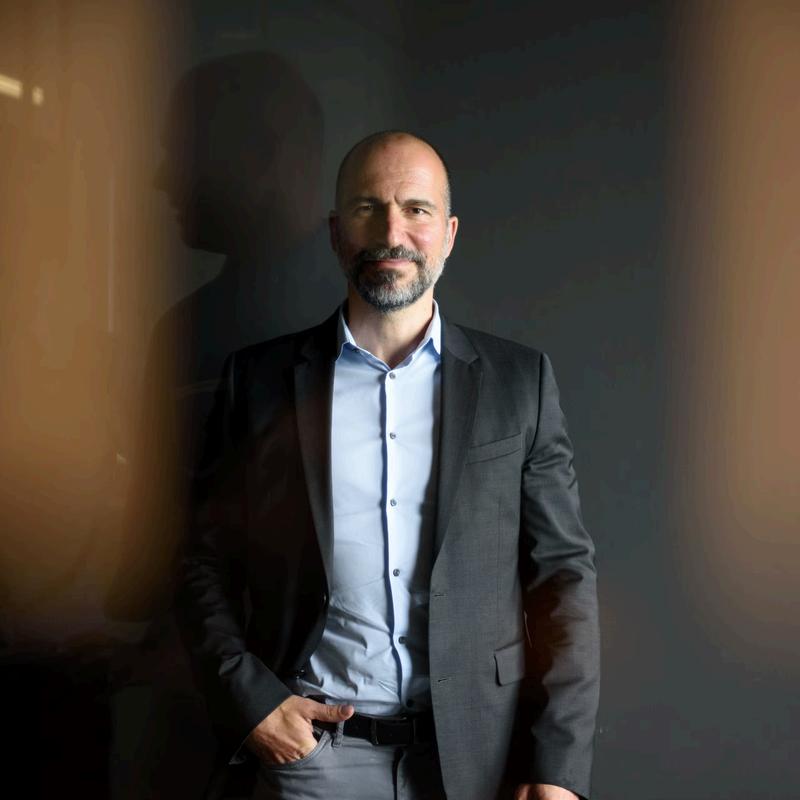
He argued this approach allows fleet owners to extract more value from each car “Instead of a pickup 15 minutes away for a 10-minute ride, you’re going to get a pickup three minutes away. That means higher utilization, more revenue per car, per day.” Faster pickup times and denser demand through Uber’s platform translate to higher utilization, meaning more revenue per vehicle each day It’s a model built to expand without weighing the company down with physical assets
Uber is already integrating autonomous vehicles into its network, with Waymo cars picking up riders in Austin and Atlanta Dara said “Customers who experience the product rate it highly and use it again” Rather than competing with autonomous operators, Uber is positioning itself as their distribution engine If a company wants to maximize the revenue of its robotaxis, Dara says “We are your ticket to the maximization of that revenue.”

Dara is also looking beyond the street grid Uber is investing in electric vertical takeoff and landing aircraft (eVTOLs) and drone delivery systems, technologies he sees as essential to breaking through urban congestion. “Our transportation infrastructure is only expanding in two dimensions Traffic keeps getting worse, yet the third dimension is available,” Dara said By moving people and goods through the air, Uber hopes to relieve the groundlevel bottlenecks that limit today’s growth.
On the ground, the company is experimenting with sidewalk delivery robots and suburban drones Robots excel at short trips under a mile, while drones can quickly cross larger gaps without road congestion. Dara believes combining the two could eventually cover more than half of Uber’s delivery demand, especially for groceries and prepared food
Even with these aggressive bets, Uber is funneling substantial capital back to shareholders The company recently announced a $20 billion stock buyback Dara explained the reasoning “In the past 12 months, we had over $8 5 billion in cash flow. The business is growing top line 18 percent and bottom line 35 percent. We have enough capital to be aggressive in AV and at the same time return value to shareholders ”
He also confronted concerns about automation displacing drivers. “For the next five years, the number of robot cars coming onto the platform are not going to be displacing people,” he said Rising demand and natural turnover, he explained, will offset the introduction of robotaxis in the near term. Over a longer horizon, he acknowledged that workforce disruption poses a broader societal challenge. Uber is already experimenting with new types of work, including AI data labeling, to help create alternative income streams for its earners.
Dara’s message positioned Uber as a platform built to orchestrate the future of transportation rather than own it outright. By combining advances in autonomy, aerial systems, and delivery robotics with a marketplace that keeps vehicles and earners productive, he framed a path for scaling mobility in every direction while keeping the company light enough to adapt as the landscape shifts.
Highlights from our global community of investors, executives and founders advancing principled capitalism

was recently featured in NextTech Today, where he explored how AI is reshaping communication and redefining leadership Read his full piece here
Keith Williams and the Center for Independent Employees celebrated a major victory in Ohio helping teachers in the Continental School District secure independence from the OEA This marks CIE’s first OEA removal in Ohio and their 43rd nationwide
Amit Singh, CEO of NearStar Fusion, delivered a high-level talk on fusion energy at George Mason University’s Mason Enterprise
Spoke at the Executive Roundtable with Liberty Ventures featuring Alexander McCobin, Robert Begley and Verne Harnish
Shared that MOST will lead the Central Asia Pavilion at the Singapore FinTech Festival 2025, showcasing regional startups and positioning Central Asia as a rising hub of innovation
She joined the We Made This Political podcast with Lura Forcum and Lauren Hall, sharing an engaging conversation on her work and highlighting projects like RAFT for America and UNDIVIDE US Movie Full podcast here
She was featured on the Sunbeam Chats Podcast, where she shared her journey as an attorney, angel investor, and founder, discussing career pivots, global work experiences, and empowering women entrepreneurs through Root to Rise Full interview here
She participated in a Gwinnett Chamber Foundation event, where she spoke with entrepreneurs about building a lasting legacy.
He represented AmityAge as a moderator at ChainCamp 2025, helping foster collaboration and Bitcoin adoption across Czech and Slovak communities.
He sat down with Frank Clement, VP of Strategic Partnerships at America’s Christian Credit Union, exploring how values-aligned banking can drive positive change Full podcast here

Copy Editor
Key Account Manager
Key Account Manager
Major Giving Consultant
Copywriter

Senior Back-End
TypeScript (AWS
Serverless, PostgreSQL)
Senior Back-End
Python
Senior Back-End
Python (Flask, PostgreSQL, AWS)
Senior Mobile iOS Swift
Senior Full-stack
Node/React
Lead AI Engineer
And more

Software Engineer
Technical Support Agent
Product Manager (GenAI)

TATO
Chief of Staff

People Operations Analyst
Associate


Written by: Michelle Bernier

Living Capitalism’s Principles
F L Cuvo, capitalism represents opportunity. It hose with vision and drive to build from the p As a former hockey player, he saw how competition and hard work shape
Now as an entrepreneur, he sees m as freedom of choice for both business nd customers Athletes get to choose the that deliver the most value. Entrepreneurs mpete by delivering something better
Started Best Dam Tape
nched Best Dam Tape after years on the key players depend on tape, yet most underperform He knew athletes needed g stickier, cleaner, and more durable Best pe was built to solve that problem But mission is broader. He wants athletes and eurs to chase their goals with confidence, heir equipment will hold up under pressure
Logan’s philosophy for building Best Dam Tape reflects the values he absorbed through sport He applies the principles of free enterprise every day. Compete by raising the bar, not by cutting corners. Stand behind the value you deliver, and don’t make excuses when the standard slips. Success, he believes, comes from creating opportunities, for athletes who depend on reliable gear, for partners who share the same vision, and for anyone willing to work hard to win their place in the market
Ice, Hard Lessons
Like any venture, the road hasn’t been smooth For every surge of pride when a pro or a young player chooses Best Dam Tape over a legacy brand, there have been setbacks that tested his resolve Production bottlenecks, tight budgets, and inevitable moments of doubt demanded discipline just as grueling as a playoff run Logan views these challenges the way athletes see a tough season: training for resilience.
Looking Beyond the Ice
The horizon for Best Dam Tape stretches far past hockey rinks Logan envisions a standard-setting brand recognized across sports that demand reliable, high-performance gear. Ultimately, the mission is about proving that dedication to craft, persistence through setbacks, and an insistence on quality can elevate a startup to compete against established giants
In the end, Logan Cuvo is selling tape and also showing that the principles that shaped him as an athlete, i.e. fair competition, accountability, and relentless pursuit of improvement, can define a business just as powerfully as they once defined his game
Written by: Michelle Bernier
For Zachary Silva, capitalism is about creating the future you want to see. He views business as the best way to make an impact and to turn ideas into reality That belief was rooted early in his upbringing His father ran a business, modeling both the risks and rewards of entrepreneurship His mother offered a different kind of encouragement, pointing to Bill Gates, then the world’s wealthiest person, and reminding him that autism was no barrier to achievement. That message stuck: entrepreneurship is possible for everyone, including those with differing abilities
Why He Chose Entrepreneurship
Zachary decided to pursue entrepreneurship both as a personal calling and as a rebellion against society’s tendency to underestimate autistic and differentlyabled people Building businesses gave him independence, influence, and the chance to challenge expectations His ventures reflect his mission to prove what is possible when talent and determination are given the right platform
Living the Principles
Zachary has built 2 companies and 1 nonprofit around this vision Catenactio helps talented creators connect with major movie studios Hotstreak Games gives casino gamers options to compete directly against each other beyond poker. Divergent Tide, his nonprofit, trains autistic and neurodiverse entrepreneurs to build businesses and support themselves
Each effort ties back to the principles of liberty, accountability, innovation, and value creation He uses entrepreneurship not only to grow companies but also to create opportunities for others who are often overlooked
Lessons from the Journey
The path has not been smooth Zachary has seen businesses fail, just as he watched his father go through the same. Even Catenactio nearly collapsed before he turned it around Those experiences forced him to learn resilience, strict budgeting, and how to build lean startups They also laid the groundwork for Hotstreak.Games, which now stands as his most efficient and fastest-growing company The lessons learned from failure gave Zachary the discipline to manage success
The Vision Ahead
Looking forward, Zachary envisions Hotstreak Games transforming underused casino slot floors into competitive esport arenas He believes casinos need fresh ways to engage players and he sees esports as the natural evolution His experience with Catenactio and relationships with major studios position him to secure high-profile intellectual property to fuel the platform.
Zachary Silva is building companies but more than that, he is building a proof point for principled capitalism, showing how entrepreneurship can create prosperity and inclusion at the same time
Written by: Michelle Bernier
Capitalism, at its best, drives innovation Glennon Simmons believes it is the only system that rewards those who take risks to create real value. “I believe that creating value for customers in a competitive market is a key driver of innovation,” Glennon explains That sense of purpose (solving problems and being accountable to results) has refined his path as an entrepreneur
Glennon’s belief in the power of innovation led him to found Portable Diagnostic Systems, a company born from the turbulence of the COVID-19 pandemic As saliva testing became a routine part of daily life, he saw both the promise and the limitations of existing diagnostic tools Many testing systems were centralized, costly, and inaccessible to those outside major healthcare networks. Glennon recognized that technology could bridge those gaps. His company’s mission is to deliver lab-quality diagnostics wherever they’re needed, combining artificial intelligence with microfluidic engineering This approach enables reliable, rapid testing in places like pharmacies, schools, and even private homes, thus transforming the accessibility and affordability of healthcare.
For Glennon, business is not a solitary pursuit but a conversation with the market “Making a sale is a collaborative effort,” he says. That collaboration begins with listening The company’s growth has been guided by understanding what customers actually need, not what the technology merely can do This ongoing dialogue has allowed Glennon and his team to refine their tools to meet the shifting demands of a fast-paced marketplace
The entrepreneurial path has been anything but smooth. Glennon is candid about the difficulties that come with transforming scientific breakthroughs into commercial realities Technical challenges, regulatory hurdles, and the constant pressure of funding are part of the terrain Yet, he describes the journey as deeply rewarding, especially when he sees the direct impact of his work in the hands of customers Each success represents not only a validation of his vision but also a reaffirmation of the principles that drive him: persistence, creativity, and responsibility.
Looking forward, Glennon’s vision for Portable Diagnostic Systems is ambitious and humane He wants to make highquality diagnostic testing as common and accessible as a home thermometer. “Our goal is to save lives, improve patient outcomes, and empower communities,” he says By moving diagnostics closer to patients (i e into clinics, ambulances, and living rooms) his company is redefining how healthcare can reach those who need it most
In every respect, Glennon’s story illustrates a form of capitalism grounded in service and ingenuity. It’s a reminder that markets, when guided by empathy and vision, can become engines for both personal fulfillment and public good Glennon’s journey reflects that balance where innovation meets impact, and entrepreneurship becomes a force for better health and a stronger society.




SAY YOUR IDEA OUT LOUD. SAY YOUR IDEA OUT LOUD.


Written by: Camilla Chellapermal
Shawn David Nelson, founder and CEO of Lovesac, opens his podcast Let Me Save You 25 Years with a story about the unlikely innovation that put his company on the map In the early 2000s, he and his team discovered that compressing their massive foam-filled sacs into duffel-sized bags made them not only easier to ship but suddenly marketable online. Lovesac stumbled into being “internet-able,” years before e-commerce became the defining channel for bigticket retail “We didn’t realize how powerful it was,” Shawn admits, reflecting on the trend he wishes he had leaned into harder
Two decades later, that experience shaped his decision to pivot the company again, this time around its modular Sactionals line, spotting a direct-to-consumer wave driven by digital-first brands like Warby Parker, Casper, and Tesla Lovesac purged its product catalog, wrapped itself around the Sactionals platform, and grew from $60 million to nearly $700 million. Shawn calls this practice “connecting the context”: seeing the bigger forces at play, aligning with them, and letting the momentum carry the business forward
It’s a theme that resonated deeply with his guest, Alexander McCobin, founder of Liberty Ventures and former CEO of Conscious Capitalism Alexander has built his career on helping leaders think in systems: capitalism itself, he argues, being the most transformative context of all “Over the last 200 years, humanity has flourished thanks to the radical idea that people should voluntarily produce and trade with one another,” Alexander said His mission now, through Liberty Ventures, is to back businesses that make the world freer and more prosperous while creating long-term value.
The conversation turned naturally to the legacy of Milton Friedman, who famously argued that the sole purpose of business is to maximize profits for shareholders While that doctrine dominated boardrooms and business schools for decades, Shawn and Alexander point to its shortcomings Both champion the stakeholder model, in which employees, communities, and the environment are as much a part of the equation as shareholders.
John Mackey, founder of Whole Foods and a mentor to Alexander, helped crystallize this idea in the book he coauthored, Conscious Capitalism As Shawn explained, Lovesac requires its leaders to read the book: “We want to be held accountable to these ideals.” Far from being charity, Alexander emphasized, conscious capitalism is about building healthier ecosystems that in turn create more durable profits
Shawn pressed Alexander on where the next contextual wave might come from Unsurprisingly, artificial intelligence dominated their discussion “There’s going to be so much productivity unleashed from AI,” Alexander said. “The bigger question people will ask is: what values are driving it? What is this being used for?”
Shawn drew a sobering parallel to the rise of the internet Ignoring AI, he argued, would be like ignoring e-commerce in the 1990s. But in contrast to that earlier wave, he believes the AI era will put a premium back on the human side of business: trust, empathy, and character may soon become a leader’s only durable competitive edge.
“If what Alexander is saying is right,” Shawn mused, “then the value a human has to offer is more intrinsically related to being human than ever before ”
The conversation took a personal turn when Alexander asked how Shawn was preparing his own children for that reality Shawn described small but deliberate practices At restaurants, he never orders for his kids Even if it takes 3 tries, they must look the server in the eye, speak clearly, and advocate for themselves “It’s painful when they’re young,” he laughed, “but there’s great value in making them speak up.”
He also spoke about the grounding role of his faith community, which provided both moral framework and social capital when he moved his family across the country. “Just being part of something bigger than yourself,” Shawn said, “is invaluable ”
These stories underscored the larger point: if AI and automation strip away rote tasks, then the future belongs to those who can lead, persuade, and connect. The irony, as Shawn noted, is that a generation raised behind screens may find those skills harder to master That gap, he believes, is where opportunity lies for parents, teachers, and business leaders alike

Alexander pointed to Angel Studios, a Utah-based company Liberty Ventures backed, as a model of connecting the context By crowdsourcing feedback from viewers before producing films, the studio not only secured a ready-made audience but tapped into a backlash against Hollywood’s overreliance on algorithms and sensationalism In a market saturated with titillation, family-friendly content became its own counter-trend
For Shawn, it was the perfect example of how entrepreneurs can align their own values with broader cultural trends - or ‘anti-trends’ - and ride both to scale “Sometimes you already have a good product,” he said. “But if you can tweak it to align with a bigger trend, that wave can carry you further than you ever imagined ”
The episode closed with Alexander’s core advice: take the next step, even when uncertain. Shawn recalled launching Liberty Ventures with a bold retreat on Richard Branson’s Necker Island - a costly gamble that paid off when Shawn himself signed up as the first participant “Life is always about taking the next step,” Alexander reflected “Just start moving in the direction you want to.”
For Shawn, the story illustrated how risks and serendipity intertwine By putting himself out there, Alexander created the very conditions for opportunity to arise Connecting the context, in other words, begins with having the courage to draw the first line.

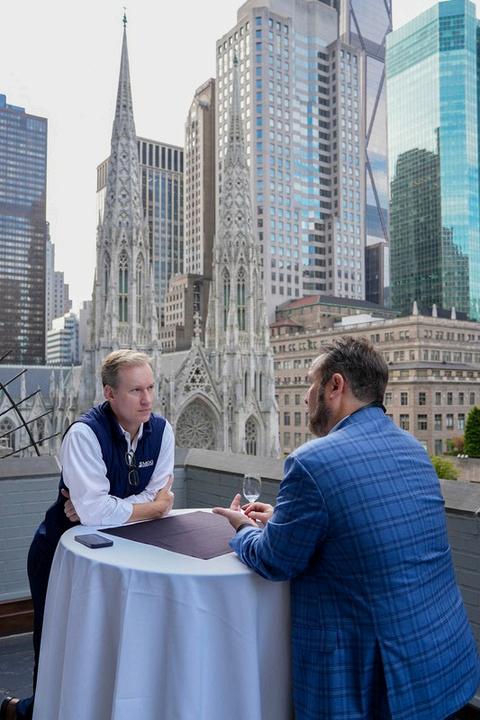
The Liberty Ventures Founder Fellowship is a unique program for pre-seed to Series A startup founders. Unlike traditional accelerators, LVFF is an ongoing relationship providing long-term strategic guidance, advisors, investor access, and a supportive community. In exchange for up to 5% advisory equity, founders gain access to Liberty Ventures' vast network and resources.
A principled path for founders building scalable businesses.



Learn Lessons from Top Investors
Get Invited to Quarterly Summits
Receive Partner Invitations


Written by: Camilla Chellapermal
On a small farm in a town of 3,500, Zach Oehlman learned his earliest lessons in business. Farming was, as he recalls, “the purest form of capital markets in the world ” Each day demanded an understanding of operations, sales, and finance By 8 years old, he was steering tractors across fields, and by 12, after the sudden loss of his father, he was running the family farm.
Those early years shaped the foundation of who he is today He learned about hard work, consistency, and keeping his word. This ethic carried him through college, where he earned a degree in finance and business administration; however, on entering the professional world, Zach confronted the familiar barrier of without connections or pedigree, no firm was eager to hire him Instead of giving up, he drove 200 miles a day to work unpaid in Chicago For 2 years, Zach poured himself into jobs that didn’t pay, believing that credibility and experience were worth the sacrifice
That determination opened doors He joined a boutique valuation firm, learned the intricacies of finance, and then, after 18 months, he landed his dream job at one of the top valuation firms in the world He quickly distinguished himself, tackling the hardest assignments and publishing his research. Yet success inside a prestigious firm didn’t feel like the ultimate destination He realized he wanted to build wealth on his own terms
So Zach left He bought rental properties, acquired a company in Arizona with almost no money down, and flipped it for twice its value within a year It was a turning point: the discovery that capitalism wasn’t just about personal gain, but about creating, growing, and scaling ventures that generated value He soon launched an investing community that expanded from a local network of hundreds to a national group of over 30,000 Over the past 15 years, he’s held daily calls 5 days a week with these investors and guided more than 10,000 consultations, ultimately designing his own F O S M framework to help others scale their businesses.
What makes Zach stand out is not just his business acumen but the philosophy he’s built around it. For him, a prosperous society can only exist within the foundation of trust; however to build trust, one must learn the principles and values that create this trust To Zach, capitalism begins with the core tenet of respect for individual agency: the freedom to pursue goals and exchange value He worries that when the principles of capitalism are hidden, it will be demonized by those who don’t have access to information and cause people to lose faith in it, seeing only exploitation rather than empowerment To counter that, he created Learn and Grow Rich, a platform where he freely shares the principles of capitalism and provides everyone with a pathway to prosperity

Zach says “I do this because I realize to really live in a free market, I need everyone else in the free market to be prosperous so that I can be prosperous”. Zach lives by the principles of capitalism by giving away his intellectual property, knowledge, software, and frameworks “The information that creates the context called capitalism” he explains, “can stay alive through the sharing of the information and implementation of the ideas”
This belief in open access has carried into his leadership at Liberating Humanity and the Child Liberation Foundation For Zach, financial success is a means to greater ends: fighting exploitation, funding missions that protect children, and empowering communities. He wants to show entrepreneurs that wealth is not simply about accumulation but about using influence to reshape society for the better
Even with this drive, Zach is candid about the pitfalls of ambition For years, he defined himself by profit and expansion Today, he urges business leaders to avoid that trap. “Don’t let your business success become your identity,” he says. His own life now includes time for writing, motorcycle rides, travel, and dinners with his wife - experiences his earlier self might have sacrificed in the name of growth
Zach’s journey from the rows of a family farm to the boardrooms of finance and now to global philanthropic efforts, reflects the arc of someone who sees capitalism as both a tool and a responsibility He has built prosperity through persistence, shared it through mentorship, and now channels it into causes that extend beyond himself.
For Zach, the heart of capitalism is not competition for scarcity but the expansion of possibility When entrepreneurs share knowledge and resources, they grow businesses and also help create a society where more people can live freely, fully, and with dignity.
Written by: Camilla Chellapermal
For Corvas Brinkerhoff, art has always been more than spectacle From his early days co-founding Meow Wolf, he saw how immersive environments could change people by awakening something deeper At Meow Wolf, audiences discovered worlds that felt limitless, and Corvas noticed how those experiences stirred creativity, vulnerability, and self-reflection
That realization became the seed for his next venture, Submersive Rather than framing its projects as attractions, Corvas envisions them as spaces designed to transform state of mind. Submersive is an exploration of how art, science, design, and technology can converge to expand awareness “I started asking: What if we designed experiences not just for entertainment, but as tools for transformation? What if instead of just being wowed, people left with a deeper connection to themselves, to each other, and to the larger systems we’re a part of? That’s the seed of Submersive.”
The experiences Submersive creates are crafted to act as catalysts. Some visitors leave with a sense of wonder, others with catharsis or relief Many describe a heightened sense of connection The aim is to recalibrate, to give people a moment where they feel more alive, more open, and more present
That sense of intentionality extends to how Corvas runs the company itself. His background at Meow Wolf taught him that the most ambitious visions rely on people as much as ideas “If your primary offering is cultural and experiential, then the people behind it are the foundation. You have to choose them carefully and care for them deeply ” Equally important, he says, is thinking clearly about capital. Where Meow Wolf had to learn hard lessons about financing, Submersive is taking a more deliberate path: aligning the right kind of investment with long-term vision, rather than chasing growth for its own sake. Sustaining impact, he explains, means moving beyond novelty and building something that resonates long after the initial encounter
Looking ahead, Corvas imagines 2 horizons for Submersive. The first is physical: creating a global network of cultural sanctuaries, spaces that offer more than relaxation, inviting transformation through immersive design The second is scientific: using that network to push forward an understanding of how light, sound, temperature, touch, and movement can be orchestrated to support human wellbeing. For him, multi-sensory design is a frontier not only for creativity but for health
At its core, Submersive is an experiment in possibility. Corvas sees it as a way to expand what cultural spaces can do and how they can help people reconnect with themselves and with each other It’s a continuation of a journey he’s been on since Meow Wolf, but with a new focus: not just creating worlds to step into, but creating worlds that help us step more fully into our own lives
Written by: Zussel Ramos
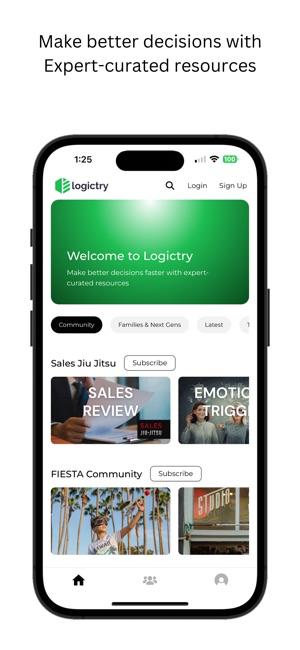
Chris Fronda is no stranger to building. With a background in physics and mechanical engineering, he has worked with Apple, NASA, and Pfizer He founded his first company at 26, and has since lived the full arc of entrepreneurship. His latest venture, however, might be his most ambitious
At LogicTry, Chris is creating a global expert network designed to restore logic and critical thinking back to decision-making in business, media, and public discourse
The premise is straightforward: experts should be visible, credited, and compensated, especially at a time when AI tools and superficial commentary often eclipse genuine expertise
“We’re scaling a network of a thousand subjectmatter experts around the world. The goal is simple: more logic, less noise ”
LogicTry elevated people rather than replacing them, ensuring that human insight remains central while giving experts proper recognition It envisions a marketplace where decisions are strengthened by authentic knowledge rather than automated shortcuts and algorithms
For Chris, this reflects capitalism at its most constructive While not flawless, he sees it as the most effective system yet for rewarding innovation and effort, particularly when incentives are aligned and creativity has room to flourish
“Capitalism isn’t perfect. But it’s one of the best systems we’ve created, because it rewards innovation, hard work, and value creation ”
Chris is not defending the status quo. He is doing something better by working to improve it LogicTry is one expression of that ambition
Written by: Camilla Chellapermal
When Simone Collins talks about capitalism and liberty, to her, they are conditions that allow human progress to unfold. “Humanity cannot flourish if it becomes stagnant,” she explains. Evolution, she believes, doesn’t stop with biology and carries through culture, technology, and the ideas we pass down In that view, capitalism and liberty act as engines of change Protecting them is central to how civilization adapts
For Simone and her husband, Malcolm, these beliefs aren’t just theory. Their marriage itself grew out of shared entrepreneurial instincts When Simone reached out to Malcolm on the dating app OKCupid in 2012, her first message was about the startup he was building Business became a foundation for their relationship, and within a year they were cofounders, running a startup together that eventually took them through a 500 Startups accelerator batch. From there they raised a search fund, acquired a company with offices in the United States and Peru, and expanded into a portfolio of ventures Alongside those efforts, they co-authored 5 books, including a Wall Street Journal bestseller on governance, founded a nonprofit, and launched a podcast!
While many couples hesitate to mix love and work, Simone sees their partnership as a continuation of something deeply human For most of history, marriage was an alliance: a way for people with shared values and goals to pursue projects too large to tackle alone She believes reviving that vision (where commitment is both personal and practical) could strengthen not just families, but entire societies
The couple’s shared projects today center on human development and the future of civilization. Their investments focus on companies working in advanced reproductive technologies, gene editing, and related fields that could shape how humanity survives the disruptions ahead “Founders who are trying to tip the scales toward long-term flourishing need as much support as possible,” Simone says.
The urgency they feel comes from demographic data that, in their view, is being ignored at society’s peril Fertility rates across the developed world are in freefall. That shift, Malcolm warns, is driving countries toward what he calls “dependency ratio cascades” or moments when too few workers remain to support retirees and social safety nets collapse When those crises hit, tax burdens may rise so sharply that both individuals and companies flee, leaving hollowed-out economies behind.
To the Collinses, this is a looming reality. They’ve been speaking with policymakers, national leaders, and private groups to stress that while fertility decline cannot be reversed in the near term, countries can prepare themselves in ways that soften the blow. They argue that delay only ensures deeper suffering
Malcolm frames the stakes in stark terms. “Who controls the future of humanity will be decided within our generation,” he says He points out that the rare populations maintaining high fertility while embracing technology will be disproportionately influential. Meanwhile, artificial intelligence has introduced an entirely new form of non-human intelligence into the equation which is something no previous generation has faced Humanity’s future will depend on how these intelligences are integrated into society

At the same time, global politics is fracturing along cultural and ideological lines Malcolm describes 2 emerging camps: one, a centralized urban monoculture aligned around bureaucratic global governance; the other, a decentralized alliance of cultures intent on preserving autonomy and resisting homogenization. The Collinses see themselves as part of the latter, backing projects and products that keep power distributed and cultural diversity alive
The scope of their vision is immense, stretching from fertility rates to AI to the survival of liberty itself Yet for Simone, it comes back to the same principle that drew her to Malcolm more than a decade ago: a belief that human flourishing depends on those willing to build As she and Malcolm continue to invest, write, and advocate, their work is shaped by a desire to navigate the crises of today, and also, to leave behind a civilization resilient enough to keep evolving.
Written by: Camilla Chellapermal
For Aleksey Matyushev, progress has always come from a willingness to experiment. That idea shaped his early career in aerodynamics and today, defines the company he co-founded, Natilus After nearly 2 decades in aviation, Aleksey is convinced that the industry needs more than incremental updates it needs a reimagining of how aircraft are built, how they perform, and how they fit into a world with rising demand and evolving needs
Aleksey’s entry point into aviation was through design At Piper Aircraft, he was entrusted with guiding aerodynamics on projects like the PiperJet Altaire and the M600, experiences that grounded him in the realities of production while also exposing the limitations of traditional aircraft models Later, at Kratos Defense, he took on the challenge of military UAV systems, refining the skills that would prepare him to rethink not just a single project, but the entire direction of aviation Consulting for defense programs further reinforced a conviction: there was room, albeit urgent room, for something new
That conviction became Natilus. Founded with the goal of developing blended-wing-body (BWB) aircraft, the company has set its sights on solving problems that legacy manufacturers are struggling to address Major production slowdowns have led to an estimated shortage of 15,000 aircraft over the next 20 years In Aleksey’s view, that gap is an opening for a newcomer with the flexibility to experiment and deliver.
Aleksey’s mission is to develop aircraft that are not only hyper-efficient, but purpose-built for the economics of modern air transport The BWB design Natilus is advancing offers significantly lower fuel burn, greater payload capacity, and lower operating costs. Those advantages appeal as much to airlines as to the Department of Defense, where the ability to reduce personnel requirements for contested logistics and resupply could be transformative
Behind the technical promises is a worldview that shapes Aleksey’s approach. He sees capitalism as the system that allows ideas like Natilus to exist in the first place For him, the freedom to create and experiment is the core driver of progress In markets under pressure to improve efficiency and sustainability, Natilus represents a test of whether innovation can still break through in an industry dominated by established players
Aleksey’s commitment to experimentation is deeply lived It has defined every stage of his career from refining jet aerodynamics to challenging long-held assumptions about how aircraft should be built With Natilus, that mindset has evolved into a vision that is both ambitious and grounded: creating aircraft that meet the economic realities of airlines and freight operators while also addressing the environmental demands of the future In Aleksey’s view, the skies are not fixed, they are open to reinvention and Aleksey is intent on showing the world just how far that reinvention can go
Written by: Camilla Chellapermal
When Christian and Johannes speak about liberty, they do so from very different starting points Christian, an economist with a PhD, traces his path through the study of human action. For him, liberty is inseparable from the freedom to exchange, create, and build without coercion As he immersed himself in the Austrian School of economics, the conviction grew that societies thrive when individuals are free to pursue their ideas and enterprises on their own terms.
Johannes, a psychotherapist steeped in Jungian psychology, arrived at liberty through another door entirely His work taught him that healing often begins when individuals recognize and release the unconscious forces binding their will Psychological freedom, he discovered, is as essential to human flourishing as political and economic liberty. When people are unshackled internally, they are able to contribute more authentically to their communities
Together, the two found that their disciplines of economics and psychology converged on the same truth that freedom is the condition under which people grow, innovate, and thrive. That conviction is now the heartbeat of the Sovereign Scholars University Project.
Christian and Johannes want to establish a private, Classical Liberal university in the United States, rooted in the Western intellectual tradition and informed by the values of the Judeo-Christian heritage Their aim is to preserve the enduring strengths of a liberal arts education (i.e. philosophy, rhetoric, economics, psychology, and science) and also, to pair them with practical fields such as entrepreneurship, leadership, and personal development
They are acutely aware of the current state of higher education, where rising costs and ideological narrowing have left students burdened with debt yet underprepared for life beyond the classroom By contrast, Sovereign Scholars’ first program, a Bachelor in Modern Liberal Arts, is designed to form independent thinkers: men and women capable of engaging the wisdom of the past while shaping the challenges of the future
The project’s promise lies in its balance of rigorous academics coupled with the cultivation of character and practical competence. Christian and Johannes see this as the path to renewing higher education’s cultural role.
Unlike many universities that rely heavily on state funding, Sovereign Scholars is deliberately structured as a for-profit initiative. For Christian and Johannes, this may have been a financial choice but most of all, it was a philosophical one. They believe that education should be accountable to students, families, and supporters rather than shifting political winds
In practice, that means building lean operations, keeping administrative costs low, and focusing resources on academic quality They contend that tuition should be reasonable and transparent, reflecting both the costs of excellence and respect for students’ investment in their future Capitalism, as they see it, is about risk, responsibility, and accountability to those who freely choose to engage.
Launching a university demands networks, resources, and voices willing to shape discourse. Christian and Johannes are actively seeking partners, in particular investors who see education as cultural legacy, scholars and public intellectuals who can help refine curricula, and allies committed to building institutions that last
They describe the project in organic terms, as planting an oak that will stand for generations Education, in their eyes, is not a short-term endeavor but a cultural cornerstone By founding Sovereign Scholars, they hope to restore the roots of liberty, heritage, and human dignity, and in doing so, set the stage for a renewal that extends well beyond the classroom
For Johannes and Christian, liberty is more than an academic subject: it is a lived commitment And with Sovereign Scholars, they are working to ensure that freedom takes root in minds and communities for decades to come.
Written by: Camilla Chellapermal
When Matt Holmes first set out to buy a home with his mother Pam, his stepfather, and his girlfriend, he thought it would be challenging but manageable Between them, the family had decades of experience in finance, construction, and real estate. Matt had worked as an investment banker, Pam had managed operations at GE Capital, and his stepfather had been building homes for more than 30 years On paper, they seemed like the ideal team to navigate a purchase.
The reality was anything but
Every step of the process was slow, complicated, and filled with gaps in the system What should have been a moment of family triumph felt more like an endless negotiation against red tape. Matt remembers the shock of realizing that if a group with their collective expertise found cobuying nearly impossible, then ordinary families without that background would likely give up before they even started
That frustration sparked an idea, and later, a company. Matt co-founded CoBuy to make co-ownership a real, accessible path to building wealth
To Matt, he saw this mission as a test of whether capitalism is truly working “Capitalism should reward value creation and hard work,” he says. “But when home prices are more than 7 times income, and wages stay flat, the American Dream gets locked away behind barriers most people can’t cross ”
Home equity has long been the most powerful driver of household wealth in the United States, but for younger generations, the ladder feels broken. 80% of renters still aspire to own, yet two-thirds worry they never will. Matt believes capitalism needs new infrastructure: tools and systems that make ownership possible again for regular people
That’s what CoBuy is building. Its platform, Co-ownerOS™, gives groups of friends, couples, and relatives the ability to pool resources, structure their ownership properly, and manage the full life cycle of a shared home What was once a tangle of legal, tax, and financial risks becomes a clear and navigable process

Matt is quick to point out that the company itself is run on the same principles he believes should guide capitalism CoBuy only builds tools that co-owners truly need because the team has lived the entire co-ownership journey themselves. There are no government subsidies or gimmicks propping up the business. Growth comes from groups choosing their platform because it saves them from costly mistakes and helps them build equity
Equity also extends to the team. When Ferhat Bilgiç joined as technical co-founder, after previously scaling a multiplayer game to hundreds of thousands of users, he received meaningful ownership in the company “That’s meritocracy in action,” Matt explains “Deliver value, capture value, share value ”
It’s a philosophy that has shaped how CoBuy grows. Customers often become advocates, paying annually before the company even markets to them Weekly product releases reflect a small team moving with urgency Every part of the business ties back to Matt’s belief that capitalism should function as a system that rewards contribution, not just capital.
The Broader Vision
Matt sees the housing crisis less as a failure of markets than as a failure of infrastructure. “Right now, 61 million Americans co-own homes without resources or tools,” he says “That’s $9 trillion in real estate managed through chaos ” Thousands more groups form every day, hoping to buy together, but most run into barriers that stop them cold
By giving those groups proper governance protocols, legal frameworks, and operational tools, CoBuy transforms fragile arrangements into secure, wealth-building partnerships And while CoBuy’s first focus is residential real estate (i e the foundation of household finances), Matt’s ambitions extend further. He envisions a future where the same infrastructure supports ownership of many different types of assets, creating new opportunities for wealth building across society
“When the sharing economy meets the ownership economy with the right infrastructure,” Matt says, “you finally open doors that should never have been closed in the first place ”
For Matt and Pam, that’s the heart of the work. What began as a frustrating family home purchase has grown into a mission to restore pathways to wealth creation Their story is both personal and profoundly economic: a reminder that capitalism, when grounded in fairness and real value, can still deliver on its promise
Written by: Camilla Chellapermal
Kevin Koharki has spent years at the crossroads of finance and education, first as a banker and then as a professor Today, he’s become the person top organizations call when they need their teams to not just glance at financial statements but truly understand them. The result? Smarter decision-making, tighter alignment with leadership goals, and in some cases, organizational transformation
One global defense company learned this firsthand when Kevin worked with its engineers By walking them through how budgets connected to the company’s larger mission, he revealed misalignments that had gone unnoticed The discovery was significant enough to prompt a restructuring of R&D spending, and the company now sends him across the world to help other divisions do the same A leading bank has already brought him in twice Law firms, CPA firms, and even groups that link government officials with private industry have also turned to him for guidance
What Kevin offers goes beyond “finance for non-financial people ” He has a knack for making financial literacy matter to whoever is in the room, whether that’s a Fortune 50 board member, a young associate, or an incoming intern For executives, that might mean sharper advocacy for budgets or strategy shifts. For junior staff, it often means building the confidence to read and interpret financial documents that otherwise felt off-limits The universal lesson is that understanding the numbers changes how people participate in shaping outcomes
When it comes to capitalism, rather than lionizing excess, Kevin believes capitalism functions best when people inside organizations understand the levers that drive it He’s witnessed the evolving workplace dynamic where human expertise combines with artificial intelligence, and is of the opinion that financial fluency is a critical part of thriving in that environment.
Kevin believes that when people at every level of an organization can interpret financial information with clarity, they become more persuasive advocates, whether they are defending a project budget or proposing a new idea. And organizations benefit when employees stop treating finance as a specialized language only a select few can read
From banking halls to defense labs, the evidence of his impact keeps growing. It is clear that his message is reshaping companies behind closed doors: when people understand the financial backbone of their organizations, they serve both their leaders and their missions more effectively
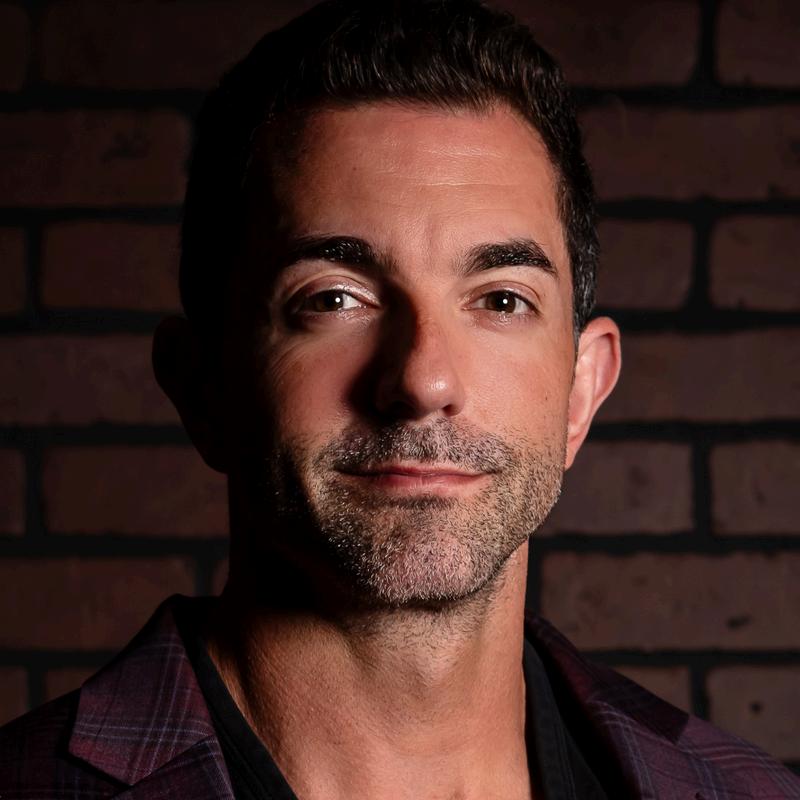
Written by: Michelle Bernier
When Louis Camassa bought his first domain name in 1998, the Internet was still the digital frontier. Few people understood what a URL even was, but Louis saw possibility The domain, lccreations com became a symbol He renews it to this day as a reminder that taking action creates opportunity, but that only quality action turns potential into progress That belief became the foundation for everything that followed, from his first cold calls to local businesses, to growing an agency that hit $500,000 in revenue in less than 2 years
Louis believes capitalism creates the freedom to solve real problems During the pandemic, he helped scale a SaaS platform that processed millions of health services for companies like Uber and Blue Apron He saw how markets reward resilience In his view, capitalism turns ideas into impact that extends beyond individual success. It is the system that transforms creativity and effort into outcomes that improve lives
The early days of e-commerce offered Louis a front-row seat to a revolution While still in college, he ran a small digital consultancy and once received a call from an executive at the Yellow Pages looking to understand “this Internet stuff.”
After Louis explained search optimization, the executive responded confidently: “We’re in every home in America That’s never going to change ”
That certainty didn’t age well In every era, Louis says, convenience decides the winners It powered the rise of online shopping, ride-sharing, home-sharing, and even dating apps What was once dismissed as unsafe or impractical has now become everyday behavior Today, 17% of all retail transactions happen online, half of marriages begin through apps, and entire industries have redefined ownership and access.
Louis believes a similar shift is unfolding right now Just as marketplaces once pulled product discovery away from standalone websites, AI agents are about to pull it from search Platforms like ChatGPT, Perplexity, and Gemini will soon handle decision-making, from comparing options to managing payments. Consumers won’t scroll or compare: they’ll ask, and the agent will act
This shift, he says, will happen faster than most expect because convenience always accelerates adoption. The brands and investors who position themselves before the wave crests will capture the next era of growth
Louis has seen what happens when investors chase momentum instead of foresight During his time scaling a SaaS platform through major acquisitions, he watched many pour resources into today’s giants while overlooking those quietly preparing for tomorrow’s disruption The real winners, he says, recognize who’s shaping the next channel of distribution before it becomes obvious
For founders, his advice is grounded in experience Having guided over 150 startups, Louis learned that progress without clarity often leads to waste Moving fast isn’t enough - understanding why you’re moving matters more The businesses that succeed are the ones that obsess over product-market fit early, because no amount of marketing spend can repair a misaligned product
From buying a domain when few saw its value to helping scale digital ecosystems that serve millions, Louis’s journey reflects a steady commitment to forward motion His story is about recognizing patterns, acting decisively, and understanding that clarity drives lasting success.
For Louis, capitalism remains a force for creation It’s the platform that turns curiosity into enterprise, and enterprise into impact. And just like that first domain name he still renews, it’s a reminder that the future rewards those willing to act before everyone else sees the opportunity
Written by: Michelle Bernier
John Tillman has spent decades building organizations, leading businesses, and championing the principles that define a free society His latest venture, BeKynder, aims to bring those values into the digital age through something simple and timeless: kindness.
John’s path to entrepreneurship began with a fascination for politics and policy; however, his real transformation came when he started his first business. That experience shaped his belief that free enterprise, not government, is the best engine for human progress “Capitalism works because it rewards service,” John says. “When you serve others well, you are rewarded quickly and repeatedly When you serve them poorly, you are punished the same way That sharpens your purpose ” He believes this feedback loop makes capitalism not only efficient but moral “Our system is based on persuasion and consent,” he explains “Government systems often lack accountability. If you’re unhappy with a government service, there’s no real place to go to complain, and no competitive alternative In business, there always is ”
For John, this is the foundation of what he calls “the American Miracle ” , a system where anyone, regardless of background, can rise by taking responsibility for their own life. “All it requires is a willingness to work and be accountable That’s what makes America different ”
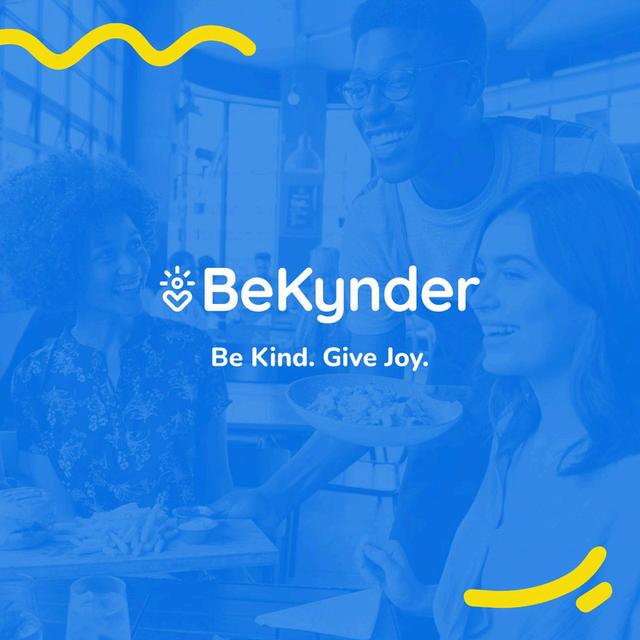
John’s entrepreneurial focus shifted when he noticed a growing divide in public life. “The media and politicians profit from conflict,” he says “But in our daily lives, we get along fine I wanted to focus on what connects us ” That insight led to BeKynder, a platform designed to encourage people to share acts of kindness
The idea started with a small experiment. John began anonymously buying drinks for strangers at airport and hotel bars “The reaction was always the same: joy,” he says “The recipient felt it, and so did I ”
One evening in Little Rock, he ordered a drink for a stranger at a Marriott bar. The bartender, smiling, asked if he’d like to “be kind” again A woman nearby overheard the exchange and joined the conversation When John mentioned he was looking for a designer, she replied, “I’m a UI/UX designer ” That woman, Eny Hathaway, soon became his co-founder, along with Jordan Schneider. “That’s when BeKynder really began,” John says. “A business was born that night,” John says
BeKynder’s mission is to make kindness visible The platform allows users to share positive acts that inspire others to do the same. John sees this as a way to shift the culture. “I want BeKynder to reshape the American narrative,” he says. “To help people focus on kindness, forgiveness, and our shared humanity ”
He believes this cultural shift is essential for America’s future “Our divisions are real, but our capacity for kindness is greater,” he says. “If we can redirect attention to the things that make us better neighbors, we can achieve our 21stcentury greatness ”
John doesn’t see BeKynder as separate from his long-held defense of capitalism. It is an extension of it. “Capitalism is built on agency, consent, and collaboration,” he says “Those are the same principles BeKynder promotes Kindness is voluntary It is an act of service It creates value ”
He points out that every act of kindness has tangible and intangible returns “When you buy a drink for someone, change a flat tire, or help an elderly neighbor, you create joy But you also create value You strengthen the bonds that make free societies work ”
John views BeKynder as a natural bridge between capitalism and community “The best businesses serve others well,” he says “BeKynder helps people do that in everyday life ”
In the end, his vision circles back to a simple and ambitious idea: to remind people that the strength of free enterprise lies not only in competition, but also in compassion “When people choose to serve others, whether through business or kindness, they build stronger communities. That’s the essence of liberty.”
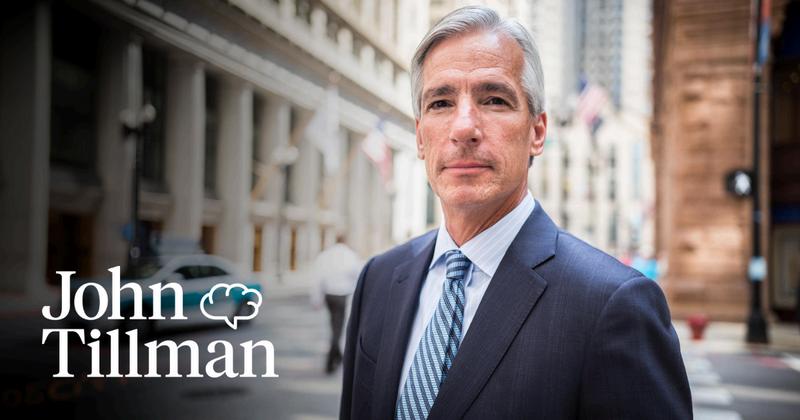
Written by: Michelle Bernier
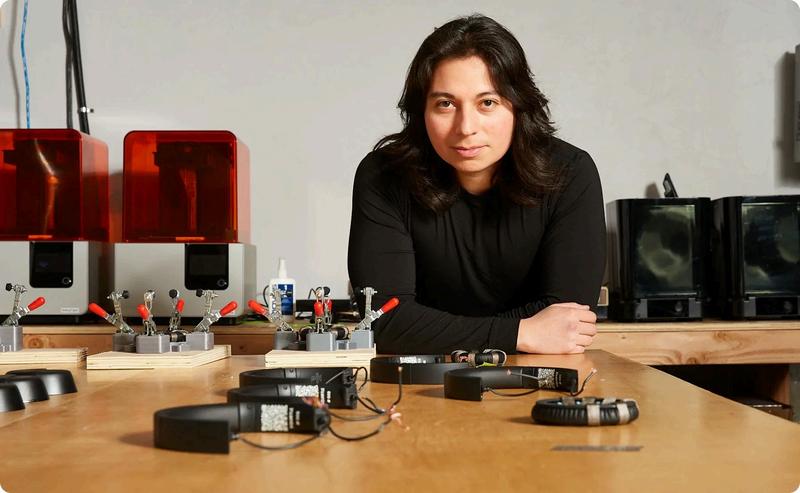
Ramses Alcaide founded Neurable with the goal of making brain-computer interface technology practical and accessible His work is reshaping how people interact with devices, how companies think about user experience, and how industries approach health, productivity, and defense
Ramses’s journey into neurotechnology began at home
Growing up around family members with neurological conditions, he developed a conviction that science could bridge the gap between human intention and digital experience That conviction carried him into neuroscience and engineering, and eventually into founding Neurable. The company designs a platform that translates brain activity into actionable insights (interpreting focus, intention, and emotion) so that other companies can embed these capabilities into their own devices.
Rather than produce a single gadget, Neurable has concentrated on building the infrastructure that makes brain-computer interfaces broadly usable It’s an approach that has attracted partnerships across consumer electronics, wellness, and defense, proving the technology belongs well beyond research labs
Neurable’s first consumer partnership was with Master & Dynamic The headphone company integrated Neurable’s AI technology into their products and saw its sales triple. That early success demonstrated the commercial potential of neurotechnology outside of academic and medical settings
Since then, Neurable’s pipeline has grown rapidly. Agreements include a large opportunity with MeSpace in the future-of-work sector worth tens of millions in recurring revenue, a forthcoming partnership with Audeze expected to generate more than $7 million annually, and collaborations with global names like HP and Renpho. On the government side, Neurable has already secured a $15 million contract with the U.S. Department of Defense, with further projects underway for Air Force applications
The brain-computer interface market is drawing attention from investors and corporations worldwide Neuralink has raised billions of dollars in funding, and Synchron has raised over $150M. In contrast, Neurable has carved out its place by focusing on revenue traction and partner adoption rather than sheer fundraising
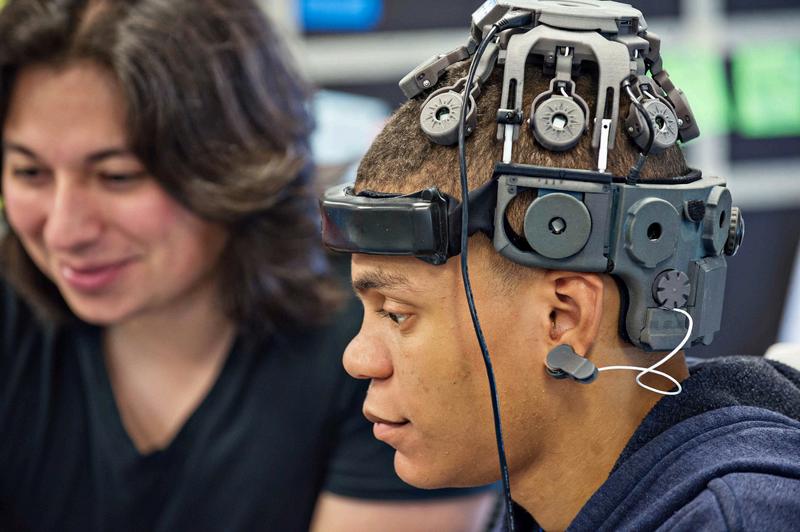
With consumer electronics firms and defense agencies both in its portfolio, the company is navigating the space with a mix of commercial discipline and scientific credibility
Ask Ramses about his priorities, and he returns to the same themes: technology must deliver measurable value, partnerships must scale, and the end goal should always be solving real problems. That mindset, equal parts researcher and entrepreneur, is what drives Neurable’s steady progress
Projections put Neurable at $39 million in revenue by 2026, with $153 million expected the following year Those forecasts are linked to signed contracts, active negotiations, and a growing roster of OEM partners. With adoption spreading across both consumer technology and military programs, the path from niche use to widespread deployment is becoming clearer.
What Ramses has built reflects a blend of personal mission and commercial rigor By grounding neuroscience in products people and institutions can use today, he has steered Neurable into a position where advanced science meets everyday utility His story shows that innovation is about making sure breakthroughs reach the world in ways that matter
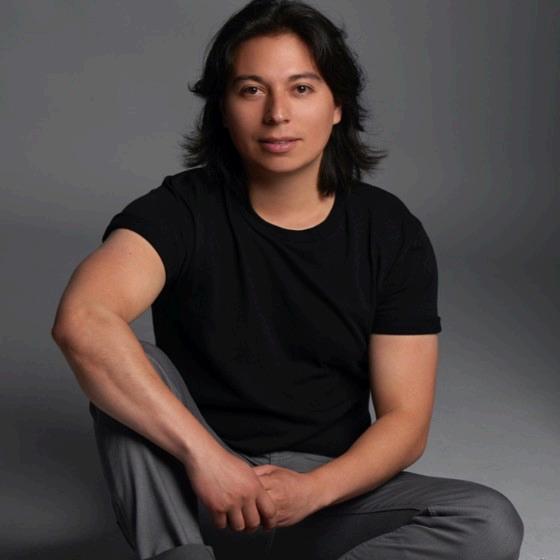
Written by: Alexander McCobin
When the U.S. government recently became a shareholder in Intel, it signaled a philosophical shift in how America views the relationship between business and the state For most of its history, the U S has championed a system rooted in free-market capitalism; however, the federal government’s move into equity ownership blurs the line between public policy and private enterprise. To understand why this matters, it’s worth examining the different systems this approach resembles, and what it might mean for America’s economic future
In a capitalist system, the means of productionfactories, companies, and resources - are owned privately. Individuals and firms make decisions based on market signals, prices, and profit motives The role of the state is limited to protecting property rights, enforcing contracts, and maintaining the rule of law.
Capitalism works not because it is perfect, but because it is decentralized Millions of people pursuing their own goals coordinate through voluntary exchange, leading to innovation, efficiency, and progress When a business succeeds, it does so because it has created real value for others. When it fails, it makes room for better ideas.
For nearly 250 years, this has been the American model: an imperfect but remarkably successful experiment in economic freedom.
Socialism is the opposite It places ownership and decision-making in the hands of the state. Under socialism, the government owns or controls the means of production and redistributes wealth to achieve social equality. Markets give way to plans; competition is replaced by bureaucratic allocation
The intent of socialism is often moral (fairness and equality) but the results have historically been devastating Without profit and loss to guide decisions, efficiency collapses Without private ownership, innovation stalls. And without voluntary exchange, freedom erodes
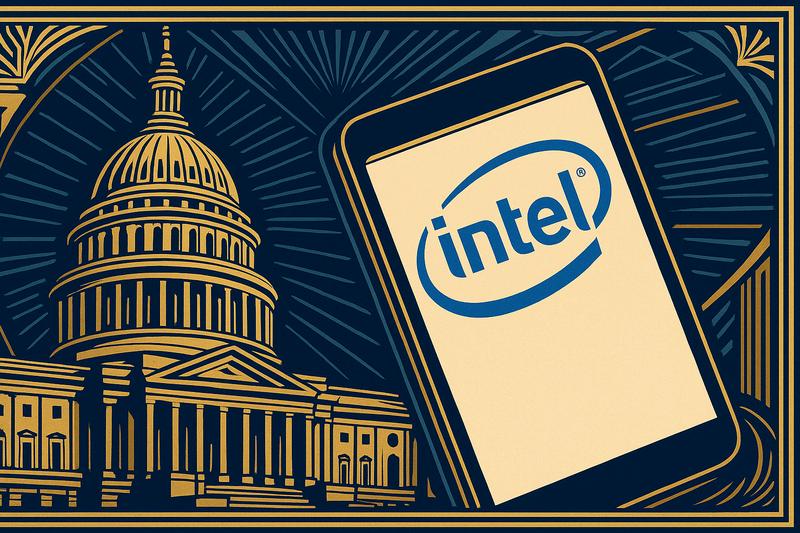
Fascism occupies a middle ground between capitalism and socialism, but in practice, it combines the worst of both. Businesses remain privately owned, but they are heavily directed by the state to serve “national interests ” The government chooses winners and losers, sets production goals, and often controls prices or labor practices
While fascism is typically associated with 20th-century dictatorships, the underlying idea of private property under state direction, can take subtler forms Whenever the government dictates industrial priorities or allocates capital for political aims, it moves in this direction, even if the rhetoric sounds benign.
State capitalism is not full socialism nor fascism. It’s a hybrid model in which the government acts as both regulator and investor, owning stakes in major companies, influencing markets, and steering strategic industries while still maintaining a nominally private economy
This is the model practiced in China, where the state holds partial ownership in “private” firms and directs investment through political objectives rather than consumer demand It’s a system that can mobilize resources quickly but often at the cost of efficiency, competition, and individual freedom.
When the U S government took an ownership stake in Intel, even under the justification of “national security” or “strategic competition,” it stepped away from traditional capitalism and toward state capitalism The motive may be understandable, i.e. securing semiconductor supply chains, but the precedent is dangerous. Once the government becomes both rule-maker and market participant, impartiality erodes The state can no longer referee the game fairly when it also owns a team
For most of its history, America’s prosperity has come from keeping markets free and government limited Publicprivate partnerships, subsidies, and regulations have existed before, but outright ownership in private firms crosses a new threshold
Capitalism thrives on voluntary exchange and competition. State capitalism thrives on political discretion and bureaucratic control One rewards innovation and consumer choice; the other rewards lobbying and political alignment
America’s entry into state capitalism might seem pragmatic today, but if left unchecked, it risks becoming permanent And once markets depend on political favor rather than consumer satisfaction, the moral and economic foundations of capitalism begin to erode
The U.S. doesn’t need to become socialist or fascist to lose its capitalist soul. All it takes is enough “temporary” interventions that never end True capitalism requires courage: the courage to let markets work, to allow failure, and to trust in freedom over control The Intel deal should remind us how fragile that balance really is Fascism: Private Ownership, Political Control
Written by: Paul H Jossey
When people think of startup funding, many imagine something akin to the Ashton Kutcher biopic Jobs A small scrappy team bootstraps until they create enough potential for a venture capitalist or angel group to capitalize their path to success
This model still works but since the JOBS Act of 2012 founders can now invite their existing networks, clients, and the public to join them, while retaining managerial control JOBS Act Title III, which became Regulation Crowdfunding (Reg CF) opened the private capital markets to the general public for the first time since the 1929 stock market crash and the federalization of the securities laws in the 1930s
The results speak for themselves. While still a relatively small part of the private capital markets, Reg CF has grown from a concept treated with disdain by both regulators and market makers to a growing and essential tool utilized by renowned financiers and promising American startups Crowdfund Capital Advisors, which curates Reg CF data, released a report detailing some benchmarks since its 2016 inception:
284 5%: Average growth in revenue between the year an issuer was successful and the following year 17.8%: Bureau of Labor and Statistics Reports that approximately 50% of all new businesses fail within 5 years Within Investment Crowdfunding, only 17 8% of funded companies have gone out of business.
$2 2B: invested $75 6B worth Companies that have been funded and priced to their most recent valuation
Average investment size nears $2 5k Average raise topped $500k for the first time in 2023
This success has not gone unnoticed Alumni of Y Combinator, the eminent startup accelerator regularly list on the Reg CF portal Wefunder. Andreesen Horwitz, perhaps the most famous venture capital firm in America, made waves by participating in a 2024 Reg CF offering.
Reg CF’s humble origins
It didn’t start out this way From its inception by Rep Patrick McHenry (R-NC), Reg CF faced hostility from Congress, the Securities and Exchange Commission (SEC), state regulators, academics, and various consumer groups
As Edward Knight, Executive Vice President and General Counsel of NASDAQ, testified in a 2017 congressional hearing: “From the outset the SEC’s view of [equity crowdfunding] was they were not for this they and made it, shall I say, needlessly complicated and did not approach it except as this this was something where the public is going to get harmed and we need to narrow it as much as possible ”
Prolix rules led to slow adoption; however by 2020, after 4 fraud-free years, the SEC warmed to Reg CF and produced a more founder-and-investor-friendly version. These changes included relaxing the communication rules to allow issuers to ‘test the waters’ and gauge interest before committing to the various costs required, ‘Special Purpose Vehicles’ that place all Reg CF investors into one line on the cap table, and raising offer and investment limits These changes along with COVID-era restrictions on in-person meetings and comfort with online investing secured Reg CF’s growing place in the private markets
Reg CF issuers typically engage with a lawyer to produce the Form C (offering memorandum and securities contract), a CPA for either a financial statement review or audit depending on the offering amount, and a portal or broker, where the exchange occurs Issuers can offer up to $5 million per 12-month period and set minimums for investors
Issuers can advertise their raise to the general public through their personal and professional networks, and their social media followings Major portals also provide email lists and other marketing tools to companies they host In total the process usually takes 3-6 months
Benefits of Reg CF for startups and small businesses
Broaden your investor base: Unlike other funding models, Reg CF can diversify your investor base from both a financial and geographical standpoint. Reg CF portals can accept investors from anywhere in the US, giving your business a potential foothold in all 50 states
Turn your customers into marketers: Reg CF allows your customers to become financially invested in your business and see their investment grow as your business grows. This provides a free marketing campaign for your business with every new investor
Incentivize your investors: Reg CF allows you to provide perks as part of the investment Depending on the product this could include the product itself, ‘founder’ status on your website, access to events, or anything else that may induce an investment.
Prove value to institutional investors: A successful Reg CF raise can show larger, institutional investors your business is ready for the big money Many larger investors are now requiring “social proof” of a company’s business model. Your business can show larger investors value and momentum and provide your business “bridge money” while larger investors evaluate your model
Reg CF will continue to change how startups get funded This is particularly true for industries with heavy public interaction Entertainment is one example Let’s say a director, producer, or actor has a movie idea Unlike in years past, they can now guarantee their audience before production starts by offering a share of the profits to their fans. They can advertise the raise on their social media and provide a link or QR code to the raise page (with certain content restrictions) They can also offer perquisites depending on investment level These could include anything from a Tshirt, to entrance to premiers or post-production parties, to a line in the movie itself. Eventually this will combine with non-fungible tokens (NFTs) and securities tokens to provide an even better fan/investor experience
The image of the hotshot startup combining with the brash VC to create world of tomorrow will be replaced by a more democratized model where companies become movements and everyone can enjoy the successes and share the risks of private capital Reg CF provides one tool for that transformation
Written by: Camilla Chellapermal
A recent Gallup poll released on September 8, 2025, revealed a stark drop in Americans’ esteem for capitalism with just 54% now holding it in favorable regard, the lowest since the survey’s inception Sympathy for big business, once peaking above 50%, has now plummeted to 37% with Democrats, for the first time, viewing socialism more favorably than capitalism.
Support remains strong for small business and free enterprise, which command approval above 80%. One theory for this divergence is that Americans are not rejecting markets nor entrepreneurship, and instead, they are reacting to a distorted picture of capitalism shaped by distrust of institutions and elite mismanagement.
As mentioned above, this Gallup poll does not signal a collapse of belief in the markets; however, the frustration lies with how capitalism has been practiced and portrayed Americans are responding to failures of integrity, not failures of principle. Four forces explain the shift.
The first of these is corporate misconduct that corrodes trust High-profile scandals and rent-seeking behaviors have blurred the distinction between genuine value creation and exploitation For instance, the collapse of FTX in 2022 and the subsequent conviction of Sam Bankman-Fried became a parable of moral bankruptcy. It was fraud wrapped in the rhetoric of innovation This reinforced the view that modern capitalism rewards manipulation over merit Similarly, Boeing’s 737 MAX crisis, tied to cost-cutting and compromised safety oversight, symbolized what happens when shareholder primacy eclipses ethical stewardship. These episodes taught the public to conflate capitalism with recklessness, when in fact they represent its violation
A second force is the economic dislocation that blurs opportunity Inflation, rising housing costs, and student debt have left younger Americans skeptical that the system works for them. The perception deepened after pandemic-era windfalls for corporations and asset holders, while wage growth for average workers lagged When the Dow hit record highs but groceries and rent became unaffordable, the rhetoric of “prosperity” rang hollow Capitalism’s legitimacy wanes when access to its rewards feels exclusive.
Third is the narrative capture by cultural elites Mainstream discourse now frames capitalism as extractive and amorala framing repeated across academia, entertainment, and political commentary. Major streaming platforms and university programs routinely depict entrepreneurs as villains and “profit” as a moral failing. The influence is subtle but pervasive When generations are taught that wealth is zero-sum, aspiration recedes
Last, is a visible contract between local virtue and corporate distance. Americans still admire their neighbourhood restaurant, their local manufacturer, their family-owned construction firm These are tangible embodiments of free enterprise: accountable, personal, and value-creating By contrast, megacorporations often appear detached The Disney-Florida dispute and similar corporate political entanglements blurred the line between enterprise and activism, alienating both sides of the ideological spectrum. The result is resentment not toward capitalism itself, but toward institutions that seem to have lost commercial focus
These examples all clarify the poll’s message that Americans have not abandoned capitalism, and they still believe in free enterprise They are demanding that it once again reward ingenuity, accountability, and integrity And, they simply need to be reminded what authentic capitalism looks like
This is precisely the vacuum that Liberty Ventures and Principled Business seek to fill: by reconnecting capitalism to its moral and entrepreneurial roots
Founded in 2023 by Alexander McCobin, Principled Business’ mission is to build the ecosystem of investors, executives, and founders who create value, and advance the principles of capitalism - to Bring Capitalism Back by linking integrity, investment, and storytelling.
This network of more than 20,000 members forms a living demonstration of capitalism’s creative energy For instance, of the hundreds of productive connections monthly, 80% lead to meetings and 13% to tangible business relationships, proving this network is a marketplace of collaboration rather than slogans.
Through its Capitalists for Capitalism magazine, global summits, and podcasts, Liberty Ventures elevates real stories of principled entrepreneurship. It reinforces the message that the world’s most transformative technologies emerge from the free exchange of ideas and capital And through programs like investor pitch days, accelerators, workshops, storytelling labs, and peer cohorts, it trains emerging leaders to build successful ventures and to defend capitalism within their ventures and on behalf of capitalism itself.
The Gallup findings should not be read as an obituary for capitalism. They are a warning that the system’s moral credibility is eroding, even as its material success endures Therefore, the way forward is for capitalism’s defenders to demonstrate its benefits through lived examples, for investors to recognize the ventures that embody innovation with integrity Additionally, entrepreneurs must be willing to embrace being the face of capitalism instead of allowing faceless institutions to take that role And above all, the public must be shown that capitalism, when rightly practiced, remains the most powerful engine of human progress ever devised.
Liberty Ventures models precisely this path with its commitment to tangible storytelling and its mobilization of its network devoted to being capitalism’s best face. By aligning capital with conscience, it cultivates ambassadors, each a living rebuttal to the cynics
The polling data showed a public starved of trust, clarity, and proof Thus the solution is not a retreat from capitalism but rather, an encouragement of its renaissance. The mission now is clear: reclaim the narrative, and with it, the future of American prosperity Bring Capitalism Back.
Written by: William Kline
Building a business is building a network of consent
Those who think this is easy, have never tried to do it
Those who downplay its importance have never lived under a system that disregards it
Consent is the cornerstone of respect for individuals. Consent is also the foundation of value creation It is how we come to know each individual’s personal expression of themselves. It is how we know if what we are offering helps, or harms, another human being. Through consent we recognize our mutual humanity and further human flourishing
The system that protects consent, insists on the universal adoption of living by consent, is capitalism
Advocating for capitalism is championing the right of every individual to make their own choices and have those choices respected by others Rightly, we are familiar with the meaning and force of the phrase “no means no.” If you do not agree to a deal, you are free to walk away Capitalism whole heartedly embraces this rule while also championing an equally important rule: “yes means yes.” Those who agree to a deal are bound by its terms
In capitalism, “no” has the same force whether it is to an individual or a group, a thief or the government In capitalism “no” has the same force against those with good intentions as it does against those with bad intentions “No” tells those who do not agree to go on their way
In capitalism, “yes” is the acceptance of an invitation, a choice to do something with another person or group It is your positive engagement with the world in how you wish to live your life Capitalism protects your “yes” just as fiercely as it protects your “no”.
Unfortunately, many think this is a fault of capitalism because people “make bad choices ” Let us be clear, respect for consent does not rest on what is chosen, it rests on the very act of choosing. Consent must be respected not because of the importance, or wisdom, of what we choose, but from the fact that it comes from our very selves. Capitalism is more than an economic system It is the outcome of each and every individual living and trading as they see fit
Written by: Camilla Chellapermal
Vernon Smith has built a career on questioning the way economists think about human behavior Awarded the Nobel Prize for pioneering experimental economics, he has shown through controlled studies that markets often behave in ways theory alone could not anticipate. In a conversation with Greg LeBlanc on the Unsiloed podcast, Smith reflects on his legacy, recent books, and the influence of Adam Smith
Now emeritus professor of economics and law at Chapman University, Smith continues to publish at a pace that would humble many younger scholars Recent works include Economics of Markets and Humanomics, co-authored with Bart Wilson, along with his two-volume memoir A Life in Experimental Economics He is currently working on a study of Adam Smith’s philosophy, which he believes holds lessons overlooked by modern economics.
Smith’s experiments demonstrated that market outcomes often converge toward equilibrium even when participants lack full information “Markets reveal patterns that theory alone cannot predict,” he observes, underscoring the value of evidence drawn from real human interaction rather than assumptions about idealized behavior.
What distinguishes his approach is an insistence on reuniting economics with ethics He highlights how Adam Smith’s The Theory of Moral Sentiments complements The Wealth of Nations, yet has been largely forgotten in economic discourse
Smith’s research shows how trust, fairness, and social context influence outcomes Markets function, but their success depends on the rules and relationships within which they operate. These findings challenge narrow models of selfinterest and bring moral philosophy back into the conversation
The arc of Smith’s career reflects a willingness to challenge orthodoxy. Early experiments startled those who assumed markets could not coordinate without perfect knowledge Later work expanded into the cultural and ethical dimensions of exchange His findings continue to inform debates on regulation, financial instability, and the resilience of institutions
Though his scholarship spans decades, Smith remains modest. He credits collaborators and predecessors for shaping his thinking, while emphasizing that economics must account for both the logic of markets and the complexity of human behavior
Today, his ideas feel especially relevant Artificial intelligence is altering how labor is organized Inflation and inequality strain policy Supply chains reveal new vulnerabilities Smith argues that adaptation occurs, but durability depends on the social fabric that underpins commerce.
For investors, business leaders, and policymakers, the takeaway is clear: efficient exchange alone is not enough. Enduring prosperity requires institutions that reinforce trust and norms, ensuring markets remain not only productive but also human
Written by: Marsha Familaro Enright
For decades, leftists have championed socialism while ignoring its mountains of skulls, from Russia to Venezuela They dismiss The Black Book of Communism, a careful tally of the 60-plus million deaths resulting from the deliberate actions of socialist regimes.
Some socialist-leaning people seem to be sincerely concerned about the welfare of others and ignorant of its egregious body count. Socialist-friendly intellectuals should know better. Their job is to identify broad truths and their impact on human life The most culpable are those who know socialism’s deadly impact and continue to advocate for it
The million-life question is: why?
Some of socialism’s apologists claim capitalism has killed more; however, their tally includes millions of deaths from wars and slavery Are war and slavery caused by capitalism? Only clear definitions can answer that question
Socialism is the socio-economic system under which the community owns all property Since all the people living together can’t be in control at the same time, in practice, the leaders control the use of property
The result: those with the power of the state control and direct economic activity. Hence, horrors such as the deaths of 6 to 8 million under Stalin’s state-directed seizure and disposal of farm produce in the Soviet Union alone.
Capitalism results from the system in which property is owned by private individuals, government is sharply limited, and individual rights are protected, such as free speech and trial by jury
Since Britain and the U.S. first implemented this system in the 18th century, creative individuals have been able to well-deploy capital, resulting in profuse economic activity Despite the disruptions and truly serious problems along the way, capitalism has brought the highest increase in wealth and relief from poverty to the greatest number of people than any other system on earth.
However, socialists confuse the public by equating capitalism with mercantilism, a system in which government officials ladle out economic favors to cronies Yet “crony capitalism” is a canard: cronies have been around in every state More precisely, the problem is crony statism.
Highly limited government and the rule of law, in which individual rights are protected, delimit the favors officials can distribute to cronies, equalize opportunity, and result in the peaceful and productive pursuit of self-interest and increased living standards for all.
Wealth is not static - it is created How else did we get from caves to skyscrapers? Yet, while a rich person can live well anywhere, it’s the poor who especially need free choice made possible by private property and individual rights if they are to create wealth and follow their own dreams.
And yet the mystery: leftists claim to care about the “poor and oppressed,” but the hockey stick of GDP since industrial capitalism’s establishment fails to persuade them that capitalism is a good system
And they don’t just criticize capitalism: they revile it Why?
Because socialists are collectivists and capitalism is individualistic. Socialists believe that the ultimate good is “society,” the group, not the individual This group may be the nation, the family, the ethnic tribe, the similarlygendered - you name it. Caring for and helping others is their highest value, their moral duty, and they claim to believe that socialism achieves it And that point is the intersection of the moral and the practical because, if capitalism is dominant, people care for themselves. It is the individual’s independence which scares these socialists, because, if everyone is independent, no one needs them!
Under capitalism each person can choose his or her own path of highest potential, not someone else’s idea of how to live The result is that individuals all over the world are lifted out of poverty by following their own creativity to produce
But living under capitalism demands an attitude towards others which is missing from the collectivist picture. For example, many teachers are socialists because people who go into teaching tend to want to help others, as do nurses and doctors And there’s plenty of good in helping others I’m a teacher myself, but I don’t do it out of a moral duty I do it as an exercise of my highest powers of understanding and skill, and I enjoy seeing the young flourish I strive to help them reach the point where they don’t need me. As renowned Italian educator Maria Montessori said:
“The greatest sign of success for a teacher…is to be able to say, ‘The children are now working as if I did not exist.’”
Those who are collectivist in their core want something far different They want power over others They infantilize to keep others dependent, like mothers who reward and enable children to stay at home forever The collectivist focus on control reveals this motive They dissemble by presenting a false alternative: which group are you going to let control you? Are you going to be a “wage slave” and let some rich guy tell you what to do, with his business and jobs, or are you going to have a say by voting for the politicians and party that will control the economy? Nowhere do they offer the choice of independence in which you control your own life
To stop the scourge of collectivist guilt-induced government programs, capitalists need to counter their ethics with a different moral model and assert capitalism’s spiritual as well as material good
It’s good because it gives each individual the opportunity to exercise his or her highest human virtues such as selfreliance, productivity, and reasonableness, while, at the same time, enabling individuals to make a good living
A few years ago, Lenore Skenazy, of the book and blog Free Range Kids, dug up a 1905 newspaper article about two boys, 13 years old and 5 years old, who were celebrated for traveling by themselves to Washington, D C , and then San Francisco Their adventure reflected the self-reliance venerated in that era and shot through Horatio Alger’s hugely popular novels, such as Ragged Dick, in which a young boy radically improves his own life. That moral outlook was celebrated in late nineteenth and early twentieth-century America.
We need a return to that spirit! Challenging the collectivists’ moral presuppositions is critical Let’s trumpet the valor and superiority of capitalism and wipe socialism and its destructive power from the face of the earth.
Written by: Adam Trexler, Ph.D.
For many investors, the price of gold is a bellwether for broader economic conditions However, gold is a unique commodity. Investors tend to purchase it as a hedge against looming economic downturns and during times of prosperity No other commodity follows this paradox
In addition to the price of gold reaching unprecedented highs, this is arguably a unique, never seen, bull market Since the beginning of 2025, gold has achieved multiple record highs. On March 14, 2025, for the first time in history, gold jumped above $3,000 per troy ounce At the time of this writing, gold trades around $3,850 To drive home what this means for an individual, one ounce of gold purchased at the start of Covid has gone up 134%, far exceeding the price caused by that panic
You’re probably familiar with the golden rule, but there is another version that every person concerned with liberty should remember: “He who has the gold, makes the rules”, from the sage comic strip “The Wizard of Id” Having money is critical for liberty, both what we’re able to do and for maintaining freedom of choice Consider the opposite: a ticket for a pair of shoes issued once every other year by the government-owned factory. Gold is particularly important as it’s the only timetrusted form of money that can’t be managed by governments For those concerned with liberty, gold allows individuals freedom from supply and demandside controls
As Gold Prices Rise, What Has the Market Response Been?
Based on rising prices, we’ve seen an extreme push-pull conflict between groups interested in holding gold and those who wish to purchase physical gold The first group comprises entities such as central banks and the investor market The second is primarily jewelers and coin or bar dealers. Investors in the first group aren’t interested in the physical gold itself, primarily caring about price They keep gold in ETFs, central banks, and physical vaults Mints and jewelers, on the other hand, are interested in physical gold, selling and distributing it as coins, bars, and jewelry pieces to members of the public At present, the investor side is “winning” this proverbial war, but we expect a change as new record prices arrive.
Most investors who trade in gold do so for diversification purposes, increasing gold purchases when they feel that stocks and government-issued bonds are in trouble. These investors buy and sell digital gold using ETFs, trading it in similar fashion to stocks and bonds U S and Chinese ETFs are seeing historic inflows
Much like individual investors, central banks buy gold because it is a neutral and effective monetary asset compared to those issued by specific countries. Due to historical certainty of the U.S. dollar’s importance, the largest holdings among central banks are dollar-denominated While the dollar remains important, the prevailing consensus of the dollar as the only asset that matters is coming to an end Central banks want different assets and are reflecting it in their relentless acquisition of gold.
An individual investor is dependent on the value of their native currency for day to day living This is true whether using Euros, pounds, yuan, or any other monetary unit. However, issuers of currencies are signaling that they don’t have the same faith in the U.S. dollar as they once did, and are buying gold to offset this concern. In fact, global investors purchased more than 1,000 tons of gold in 2024
There is a crisis in gold ownership If we the people, all people, don’t have gold, we are speeding an age of power consolidation that no thinking individual should want. Individual consumers are asking, “how do I get the gold I want, and what will the price be?” This leads to fear of missing out, and demand for gold on the rise worldwide A key problem is the unaffordability of physical gold
Valaurum exists to solve this problem. Our mission is to democratize wealth-building for all and we do this with the Aurum®, a bill containing gold and made with patented nanotechnology Aurum bills are sold in denominations literally everyone can afford, mirroring paper money For every gold bill we issue, true, intrinsic liberty grows
When we all own gold, liberty is in the wallets of the people

Written by: Mischa Kowall
It’s much easier to tear others down than find real solutions to difficult problems facing the country (and the West more broadly) Just ask one of the nation’s leading socialist voices, Bernie Sanders
In response to Elon Musk’s potential trillion dollar pay package proposed by Tesla’s board, Sanders remarked: “Tesla is proposing a deal that could give Elon Musk $2 trillion in wealth, more than the bottom 59% of Americans combined Does anybody in America think this is sane?” [1]
Sanders’ characterization of the proposed compensation package suggests that Musk will be receiving a $1 5 trillion gift, which would certainly be insane if it were true; however, this is not the case. Sanders’ remarks characterize the zero-sum game belief behind the socialist perspective that wealth and resources are finite, so if the wealth of one person or group increases, it must come at the direct expense of others In Sanders’ view, economic gains by the wealthy are assumed to be taken from the working class, rather than created through productivity, innovation, or growth
To better understand where this trillion dollar pay package comes from, and why Sanders is incorrect, one has to just scratch the surface of the proposed terms The package could be worth up to $1 trillion, but this is contingent on Musk meeting all of his targets, which is an important detail that Sanders omits as the foundation of his straw man To unlock the full payout, the company must grow its market cap from roughly $1 trillion today to about $8.5-$8.6 trillion over the next 10 years or so. Tesla’s adjusted earnings/EBITDA would have to increase from about $11.44 billion to about $400 billion Considered in light of the extraordinary value Elon Musk will have to create for shareholders in order to receive the maximum payout, it starts to seem more like reasonable compensation, but that’s just the beginning
Digging just a little bit deeper into the proposed milestones reveals the broader value creation that will result if achieved In addition to the proposed financial milestones, Tesla will need to sell millions of electric cars, deploy robotaxis, and produce one million humanoid robots. Much as he did with EVs, Elon will have to effectively establish consumer and business markets in both humanoid robotics and autonomous vehicles that do not exist today In the case of Robo-taxis Tesla’s closest competitor in the US, Waymo, has a fleet of about 2,000 vehicles, and the current market for humanoid robots is nascent So long as voluntary exchange remains a core feature of the market, those consumers and businesses that purchase Tesla’s products will reap the value of these tremendous innovations. When taken together with the above-mentioned shareholder value that will need to be created, Musk will absolutely be creating substantial, new value if he receives the benefit of the payoff outlined in the proposal
Aside from the shareholder and consumer value that Elon will have to create, imagine what the world will look like if he’s successful. The proliferation of Robo-taxis will lead to reduced accidents and saved lives by taking human error out of the equation It will also change the face of cities that require fewer parking garages, which may result in more green spaces Costs will also be reduced for consumers and businesses by reducing the need for car insurance. In terms of the humanoid robot milestones, this could change the daily lives of millions of people as robots could handle dangerous, repetitive, or physically demanding jobs in construction, elder care, and warehouse logistics. It could be a true game changer for so many.
Just as Tesla normalized EVs and SpaceX has dramatically lowered the cost of spaceflight, success set out in the milestones of the proposed package could take autonomous mobility and robotics from something nascent to the development of historic new industries that deliver value to millions. Rather than tearing down the companies and entrepreneurs due to their past successes, let’s take the time to better understand the entire value equation they bring to the future.

Written by: Robert Begley
When critics argue that capitalism is a rivalrous “dogeat-dog” game where success for one means loss for another, they’re embracing a zero-sum mindset That’s the belief that wealth is static, and if one person gains, another must lose. This worldview, rooted in fear and misunderstanding, misrepresents how value is created in a free society
Capitalism is a system based on the moral principles of voluntary exchange, private property, and the protection of individual rights It is creation and cooperation, not conquest. That distinction changes everything.
In a zero-sum world, the size of the pie is fixed. One person getting more means another gets less That logic may apply in poker or war, but not in free markets
Under capitalism, wealth is not seized; it is created. An entrepreneur who builds a better product does not subtract from others but adds to the economy When people buy that product because it improves their lives, both sides benefit The entrepreneur earns a profit, hires workers, and enriches suppliers The pie grows
Amazon didn’t rob bookstores; it built a distribution system that gave millions greater access to goods Uber didn’t destroy taxis; it offered a better experience for passengers and flexible work for drivers.
In capitalism, transactions are positive-sum Everyone rises when innovation meets demand.
To judge the morality of a system, ask: Are people free to say no? In capitalism the answer is yes Every transaction is voluntary. You can walk away, compete, or improve. That mutual consent gives capitalism its moral legitimacy
Contrast this with cronyism or socialism, where goals are transferred by force, connections, or government favoritism In such systems, power, not merit, determines outcomes.
Many conflate capitalism with corruption; however, corruption thrives when power is concentrated, and government colludes with business. Capitalism instead respects autonomy and honors merit, leaving the customer to decide who wins
Capitalism has been a powerful force for human dignity. It allows the poor to rise, the creative to thrive, and the ambitious to improve the lives of others in the process Voluntary exchange is both practical and moral.
At a recent Liberty Ventures event in New York City, I posed a question: “Who here has had someone assume your success came at the expense of others?” I was dismayed to see how many hands went up That’s the zero-sum fallacy in action.
Karl Marx built his economic theory on this fallacy So did Gordon Gekko in the 1987 movie Wall Street, with his famous line: “Greed is good ” But capitalism is about expanding the pie through human ingenuity.
In her essay “The Money-Making Personality,” Ayn Rand writes, “Wealth is the product of man’s intellect, of his creative ability Fully as much as is art, science, philosophy, or any other human value ” In a capitalist system, ideas become reality. Value is generated, not redistributed.
In a zero-sum world, you’re in a cage fighting over scraps In a capitalist world, if you want pie, you don’t take someone else’s, you bake your own Or better yet, invent a recipe the whole town wants to buy
Think of the immigrant who launches a food truck, the teenager who builds an online store, or the engineer who designs a life-saving device They didn’t take from anyone. They added something new.
That’s the magic of a moral, creative, and free economy It gives individuals the tools to solve problems, meet needs, and improve lives, often in ways they never imagined The greatest “tool” in the capitalist toolbox is the right to create Though many businesses fail, their creators were free to try.
It’s no wonder the world’s poorest people risk everything to flee from authoritarian regimes and arrive in freer countries They understand what many critics forget: prosperity is not a handout or a fluke It’s the result of freedom plus effort.
Capitalism has lifted more people out of poverty, empowered more innovation, and expanded more choices. That’s not a side effect. That’s the point.
Here is a way to flip the script. When someone says, “The rich get richer while the poor get poorer,” don’t get defensive Instead, ask: “Do you think Steve Jobs got rich by stealing from people or by creating something millions chose to buy?”
Let the question linger. That’s how conversations shift. Not with slogans or guilt, but with truth, logic, and the lived experience of those who know what it means to create value
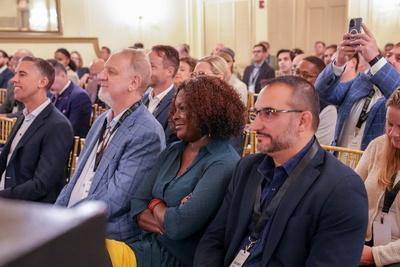
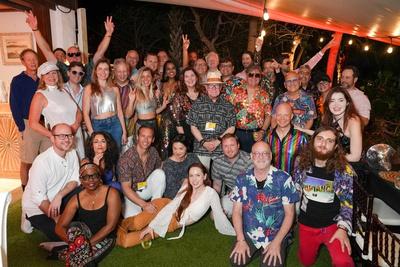
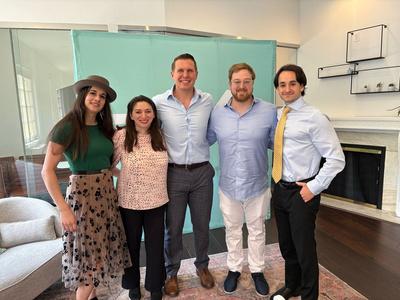

Written by: Alexka Medina
Most education technology ventures sell speed They promise faster grading, flashier dashboards, and integrations that shave minutes off lesson planning. Lexandria, led by Richard Lorenc, has set its sights on something more audacious, i e reshaping the way Americans learn.
Richard is clear about the approach “This isn’t charity This is entrepreneurship,” he explains. The company operates as a not-for-equity venture as he calls it, so disciplined like a for-profit but without the pull of shareholders Any surplus is reinvested into content, reach, and development. This is a straightforward yet unusual and radical idea in the nonprofit space: if teachers aren’t returning and recommending it to their peers, the product isn’t good enough.
Conventional wisdom says that K–12 content is controlled by school boards, textbook publishers, and politics Yet that picture is incomplete A RAND survey found that half of U.S. teachers already bypass official district materials in search of higher-quality resources Alexandria sees that gap as an open invitation
So far, 4,200 teachers use the platform By 2030, Richard wants 65,000 so about 2 in 5 high school social studies instructors nationwide Hitting that scale would mean something bigger than growth metrics. It would mark the tipping point where students across districts begin learning civic principles through a shared framework centered on individual rights, the rule of law, and constitutional governance
Richard’s bet is that teachers are starving for this kind of clarity: resources that are intellectually honest, historically serious, and operationally easy to implement Add in economics modules, civics lessons, and even statemandated content on communism, and Lexandria isn’t just offering “supplements ” It is positioning itself as the parallel curriculum America didn’t know it needed.
The Content Edge Technology as Accelerator
This fall, Lexandria will release The American Experiment: 250 Years of Enduring Principles, a course designed to align with the nation’s semiquincentennial. Unlike most civics materials, the curriculum does not smooth over the nation’s conflicts It acknowledges injustice and struggle, while also highlighting the ideals that shaped the republic.
Content is central, but technology is the lever Integration with Google Classroom and Canvas, rapid product cycles, and early use of AI for essay evaluation reduce friction for teachers. In a field where bureaucracy often blocks innovation, Lexandria is demonstrating that adoption can move quickly when barriers are stripped away
Here’s the uncomfortable truth: the civic conversation in U.S. classrooms has frayed. Students leave school fluent in social media debates but unsteady on the foundational ideas of the republic They graduate knowing hashtags, not Hamilton Teachers are left to improvise, navigating outdated materials and partisan landmines
Lexandria is stepping into that void with purpose. If Richard reaches his 2030 target, millions of students could graduate with a deeper understanding of the principles that sustain a free society That kind of educational progress could reshape how the next generation sees citizenship itself
Written by: Alexka Medina
Marketing often moves in fads One season it’s TikTok funnels, the next it’s AI campaigns or influencer blitzes. While brands pile into overcrowded arenas, a ma vast audience with extraordinary potential sits in plain sight: the Christian and conservative market that Kurt Luidhardt calls the Liberty Spenders.
With $5 trillion in buying power and more than 76 million consumers, this group is larger than the Black, Hispanic, and LGBTQ+ markets combined Yet, unlike sustainability or diversity, aligning openly with faith or conservative values rarely makes it onto corporate agendas. The reluctance is rooted in fear with many executives assuming taking such a stand would be risky The data says the opposite When companies or brands commit, they often unlock customer loyalty most marketers can only dream of
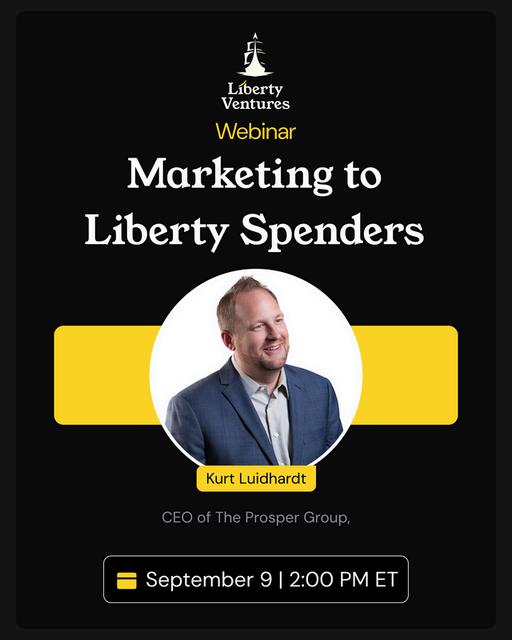
A national survey revealed that 82% of U S shoppers consider brand values when making purchases, and 75% switched brands last year due to misalignment. Among Liberty Spenders, this behavior is even more pronounced These consumers expect alignment, and when they find it, they reward it with near-fanatical devotion.
Consider the driver who passes several Popeyes locations just to eat at Chick-fil-A, or the mobile subscriber who leaves Verizon for Patriot Mobile, a carrier that calls itself “America’s only conservative Christian wireless company ” These choices are not dictated by price points or convenience. They’re acts of conviction.
Chick-fil-A and Hobby Lobby are long-standing examples of how faith-driven positioning can build empires; however, newer challengers are proving this strategy is fueling growth today.
Black Rifle Coffee transformed a pro-veteran identity into a company worth hundreds of millions. Patriot Mobile surpassed $38 million in revenue and now serves more than 150,000 customers in one of the toughest industries to enter. EveryLife Diapers has stepped into competition with Pampers and Huggies by aligning itself with profamily values They illustrate how conviction-driven marketing creates market share far beyond what traditional playbooks would predict.
Kurt Luidhardt’s argument is blunt: stop hiding your values. For decades, the common advice was to keep faith and politics away from business and branding Yet in a marketplace where consumers openly shop based on belief, silence is the bigger gamble.
The key is not to adopt ideology as a gimmick but to show clarity. Chick-fil-A shows you don’t need Bible verses in ads but closing on Sundays is enough to signal authenticity Hobby Lobby takes the ideological route with overt campaigns Both approaches work because both are genuine. The real mistake lies in hedging, i.e. trying to appeal to everyone and earning loyalty from no one
The reward extends beyond sales. Patriot Mobile and supplement company Cardio Miracle report some of the strongest lifetime value in their sectors Liberty Spenders don’t just buy once; they remain loyal advocates. In churn-heavy industries, that kind of retention becomes an extraordinary asset
Ignoring Liberty Spenders is forfeiting growth. In California alone, more than 3 million consumers fit this profile with millions more across Texas, Florida, and New York This is a nationwide movement.
The question is whether brands have the courage to lean in. Companies willing to align with these customers will capture sales, and cultivate loyalty that compounds for decades Those that hesitate will watch competitors turn conviction into long-term competitive advantage
The Liberty Spenders represent a $5 trillion force For marketers, the decision is clear: speak authentically to these consumers, and they will respond. Ignore them, and someone else will build the connection that could have been yours
Written by: Alexka Medina
For most investors, the greatest risk does not come from the market itself but from their own decisions. Kristen Wonch, entrepreneur, commodities trader, and founder of the Compounding Queens Method, argues that wealth is rarely lost to downturns. More often, it’s lost to poor habits disguised as strategy.
The market’s record underscores the point Over the past year, the S&P 500 has gained 17%, more than doubled in the last 5 years, and risen nearly 800% since 1996 $1 million dollars placed in the index then would now be worth close to $9 million. Despite this relentless growth, many portfolios fail to capture the returns Why? Well, the explanation lies not in the market, but in investor behavior
One persistent error is the belief in stock-picking prowess High-profile success stories, such as Amazon or Google, obscure the fact that only a small fraction of companies drive long-term growth Warren Buffett demonstrated this reality when he famously wagered that hedge funds could not outperform the S&P 500 over a decade. He was right: none of them did.
Another costly misstep is trying to time the market Temporary declines often trigger premature exits In April, when the market dipped 10%, many sold in anticipation of further losses Within weeks, prices recovered, leaving those investors sidelined. What appeared to be prudence was, in fact, panic.
Fees, however, remain the most significant and overlooked drain on wealth A 1% advisory fee may seem minor, but compounded over decades, it can erode a quarter of total returns Kristen recalls working with a client who had a $1 1 million portfolio. The client was stunned to learn that her advisor’s commission, described as “small,” would cost $1.4 million in long-term gains
Kristen’s position is unapologetically direct: investors must take ownership of their decisions. That means understanding their holdings, reducing costs, and staying invested The path to building wealth lies not in unnecessary complexity, but in disciplined and simple consistency
This principle extends to business as well. Companies, like investors, are often tempted to overcomplicate or rely too heavily on outside expertise Yet the power of compounding rewards those who remain committed to fundamentals and resist distractions Complexity may appeal to ambition, but discipline delivers lasting results
Kristen emphasizes that investing is not about brilliance or perfectly timed decisions It is about endurance Those who succeed are not the ones who attempt to outwit the market, but the ones who remain steady, allowing time and discipline to do the work.
Written by: Alexka Medina
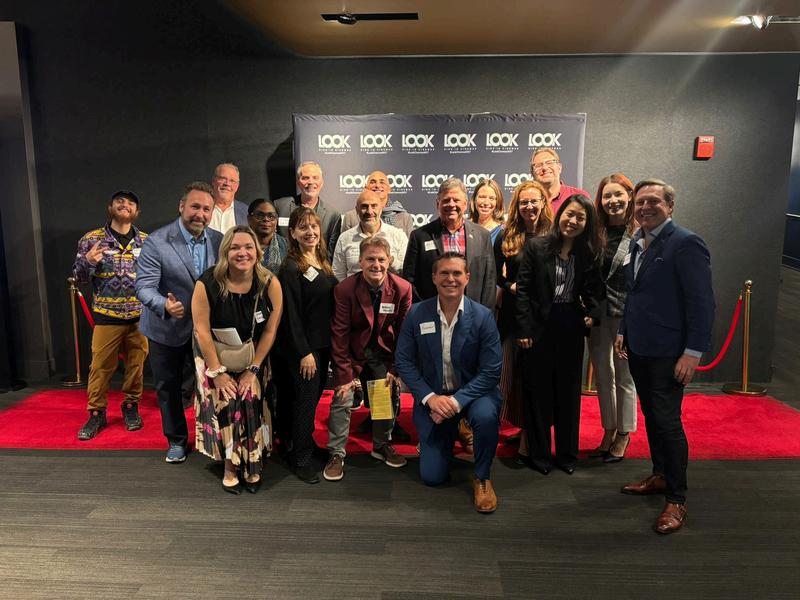
When Liberty Ventures hosts the Executive Roundtable, it is not another item on the event calendar It is where the most serious conversations about leadership, capitalism, and scale take place. This year in New York, inside the unconventional setting of LOOK Dine-In Cinemas, CEOs, founders, and investors gathered to test not only their business strategies, but their guiding principles.
The tone was set immediately by Alexander McCobin, CEO of Liberty Ventures, who issued a challenge: growth without purpose carries no weight. In a world where scale is the constant drumbeat, his words asked leaders to pause and explain why their pursuit of expansion truly mattered
Robert Begley followed with a reminder that numbers alone cannot move markets or teams Stories, he said, are the currency of trust Leaders who fail to tell theirs with clarity risk more than a weak brand. They risk credibility and the loyalty of those they depend on
Then came a shift in focus. Brandon Hatton urged the room to see wealth as more than capital He pressed executives to weigh the unseen costs of growth: burned-out health, neglected relationships, and the absence of legacy His words lingered as attendees, accustomed to quarterly targets and investor pressure, considered what their ambitions might truly demand of them

The conversation turned practical when Verne Harnish, author of Scaling Up, took the stage His framework of people, strategy, execution, and cash was already familiar to many. The difference came in the way he engaged directly with the challenges offered by those in the room Leaders exposed the hardest problems they faced, and Verne dissected them with precision, transforming broad theory into steps that could be acted on immediately Few gatherings provide such candid exchanges among operators in the midst of scaling real companies.
The Roundtable closed in the same spirit it began: open conversation. At a reception hosted by Brian Schultz (CEO of LOOK Cinemas), the walls dropped even further Partnerships were born, strategies debated, and confessions of sleepless nights shared. No staged panels, no corporate scripts: just the kind of honest dialogue that builds trust and sharpens resolve
For those who missed it, it was a missed opportunity to test ideas in front of peers, to spar with Verne Harnish in real time, and to hear leaders’ candor and their admission where the pressure breaks them. The Roundtable is not content to be passively consumed It is an environment where principled business is practiced, not preached
the candor of leaders who refuse shortcuts You missed the table where principled business is not an idea but a practice.
The next Executive Roundtable will return with the same standard: scale pursued with conviction and built to endure. The only question is whether you’ll take your seat at the table

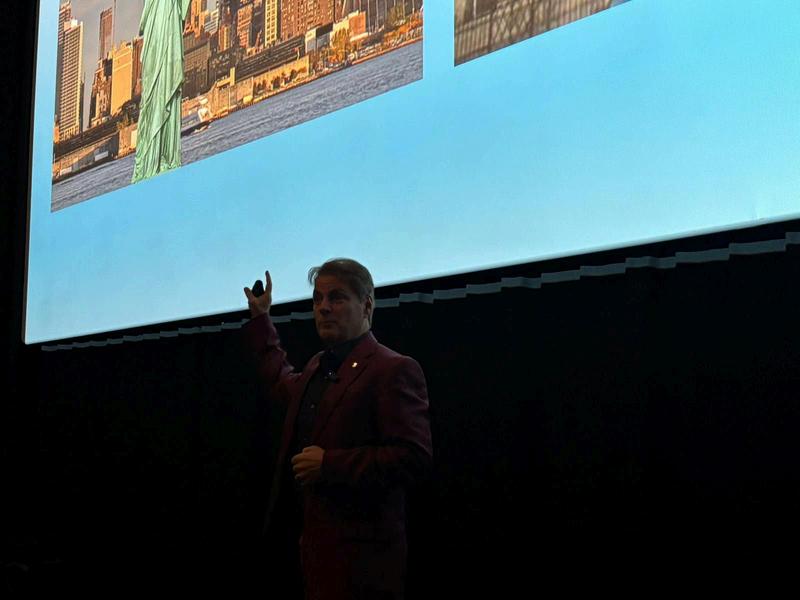
Written by: Alexka Medina
Liberty Ventures has built a reputation for curating a high-trust network Our private dinners in New York, gatherings on Necker Island, and our accelerator programs have already attracted investors and founders committed to building differently Now, the organization is expanding its reach by opening a series of flagship events across the Americas, beginning in one of the world’s most unconventional hubs for innovation: Próspera, Honduras.
The calendar begins in January 2026 with the Liberty Ventures Investor Summit in Dallas. Designed for family offices, limited partners, general partners, and angels who see capital as a tool for freedom, the 1-day program will feature liberty-driven startups, hands-on roundtables, and emerging deal flow in sectors ranging from fintech to health, AI, and energy The format emphasizes balance thus ensuring active investors and fundraisers meet in the right ratio so that conversations move beyond networking and into principled deal-making
In February, Liberty Ventures heads to Roatán, Honduras for the Principled Business Summit in Próspera. This charter city has drawn global thinkers like Balaji Srinivasan, Brian Armstrong, and Tim Draper, not only for its Caribbean setting but for its legal autonomy to design its own governance and regulatory frameworks Freed from many conventional constraints, Próspera has become a living laboratory for entrepreneurial freedom. Against this backdrop, Liberty Ventures will host a 5day experience with a program of panels, roundtables, curated networking, and immersive island experiences. The summit will be co-hosted by Erik A Brimen, Chairman and CEO of Honduras Próspera LLC, and Alexander McCobin, Founder and CEO of Liberty Ventures. Together, they represent the core mission of building economies and enterprises that connect profitability with principle

Liberty Ventures Executive Summit in Atlanta - April 24, 2026
April 2026 brings a different format to Atlanta, where Liberty Ventures will host the Executive Roundtable.
Aimed at CEOs and senior leaders, the event trades stage-driven spectacle for intimate conversations Held at LOOK Dine-In Cinemas, the event will feature candid discussions about scaling responsibly, managing growth, and staying true to mission The goal is for exchange among peers who share the same pressures of leadership.
Later in the year, the community will step away from formal agendas altogether August 2026 marks Mountain Madness in Pennsylvania, an invitation-only retreat that blends business, adventure, and camaraderie. Days will be filled with obstacle courses, shooting competitions, and lawn games, while evenings wind down with cookouts and fireside talks It’s an opportunity for members to connect on a human level, affirming Liberty Ventures’ belief that success in business is bound up with how leaders thrive in life.
These gatherings amount to more than a calendar of events Liberty Ventures is betting on a future where conviction guides enterprise, and where leaders who refuse to separate principle from performance, will shape the next chapter of business For Liberty Ventures’ growing network, the movement is only beginning
This magazine, and more importantly, all of the work that is described in these pages, is thanks to the hard work of a large group of leaders in both Liberty Ventures and Principled Business, working day in and day out to build the movement of capitalists for capitalism.
Liberty Ventures Team
Michelle Bernier
Camilla Chellapermal
Graziano Creperio
Diego Laurentin
Alexka Medina
Alexander McCobin
Zussel Ramos
Luis Silva-Ball
Magnús Örn
Steve Thomas
Adam Karl
Anar Alizamanli
Dan Garretson
Dustin Palmer
Patrick McLaughlin
Fabricio Antezana
Gabriel Grilli
Igor Zillner
Jason Syversen
Johnathan Bush
Julio Clavijo
João Ferreira
Mischa Kowall
Nolan Lwin
Rajat Vishwakarma
Rodrigo Nuila
Scott Alford
Valera Vasquez
Yoseob Lim
Ali Khan
Brian Bourgerie
Akin Oladosu
Håkon Broder Lund
Eden Eyjólfsdóttir
Pavel Koktyshev
Gustavo Toxzui Xopa
Danny Chen
Prosperine Hollande Nduwayo
Cynthia Reyes
Adolfo Urquizo
Ishmael Amini
Niko Klein
Haukur Ingi Sigrúnar
Jónsson
Jóhann Portal
Clement Ngu
Zachary Silva
